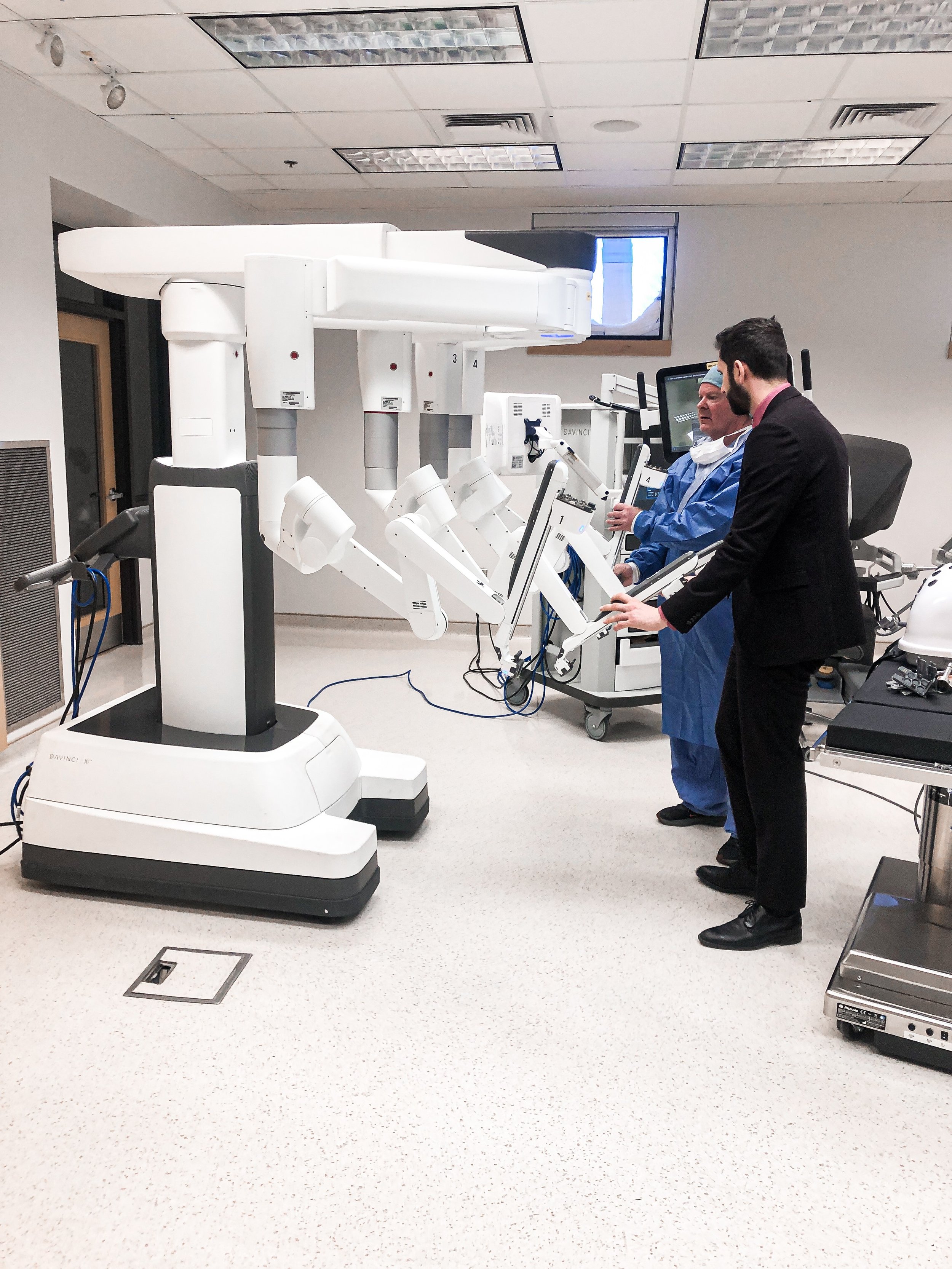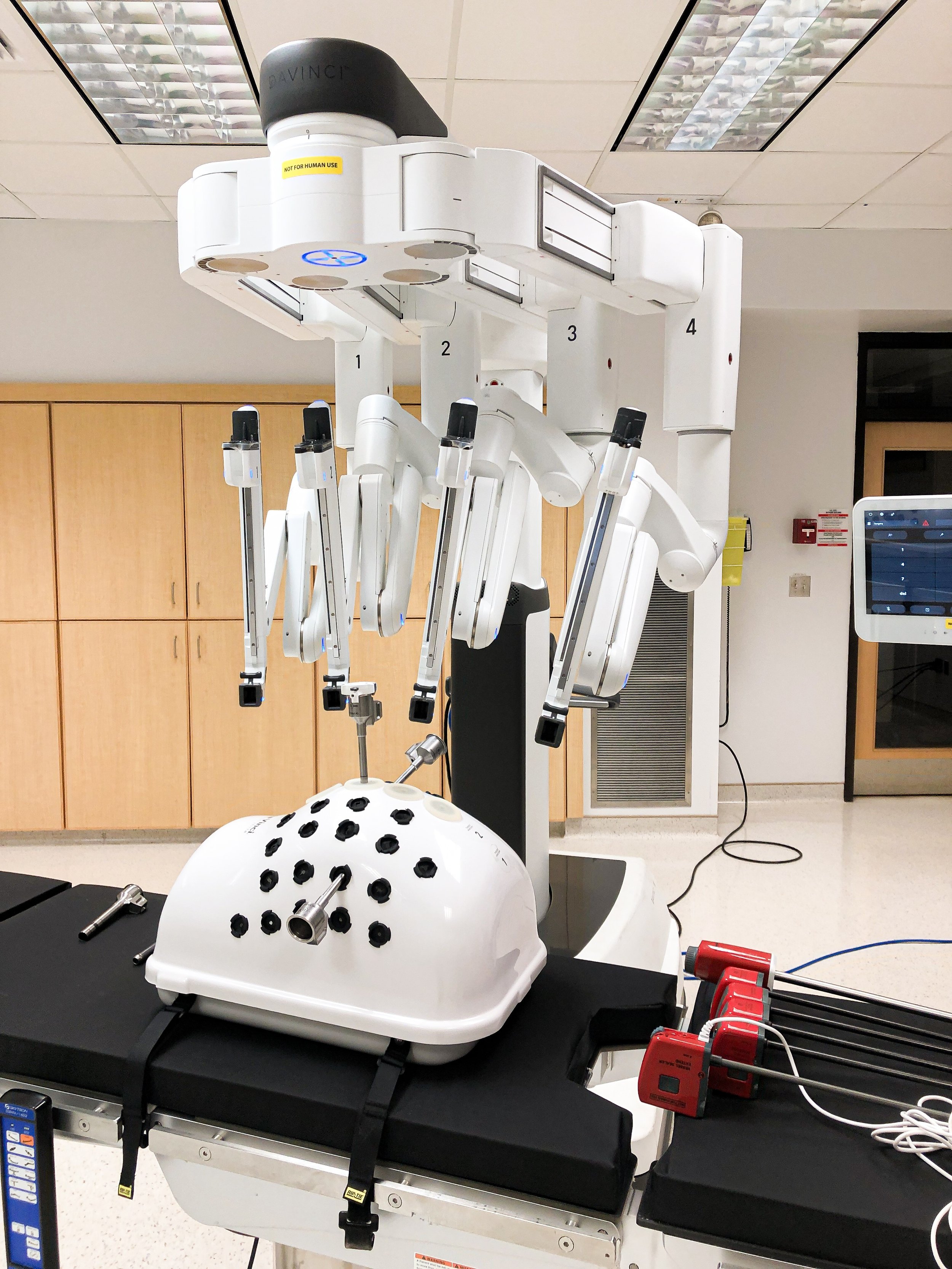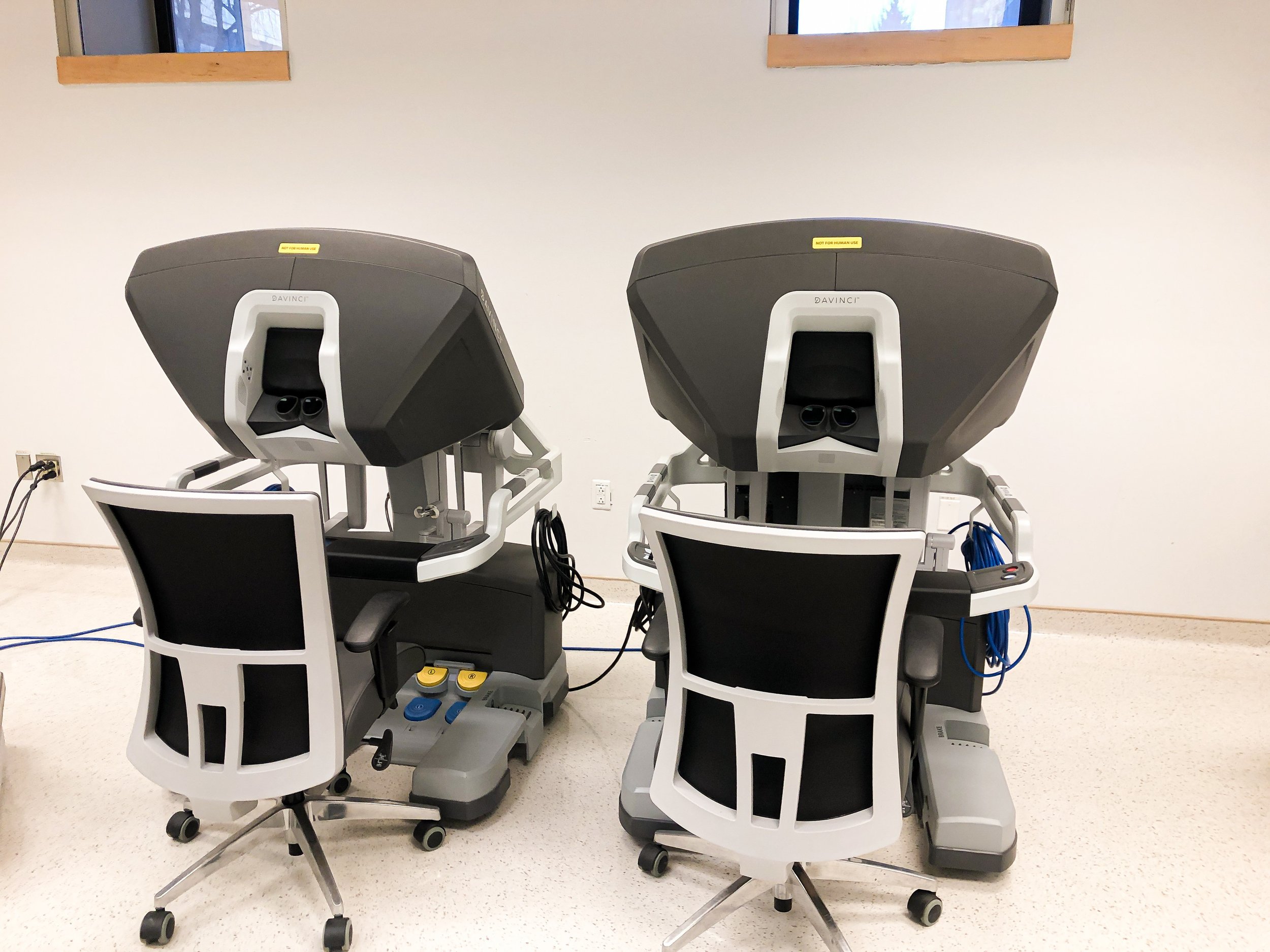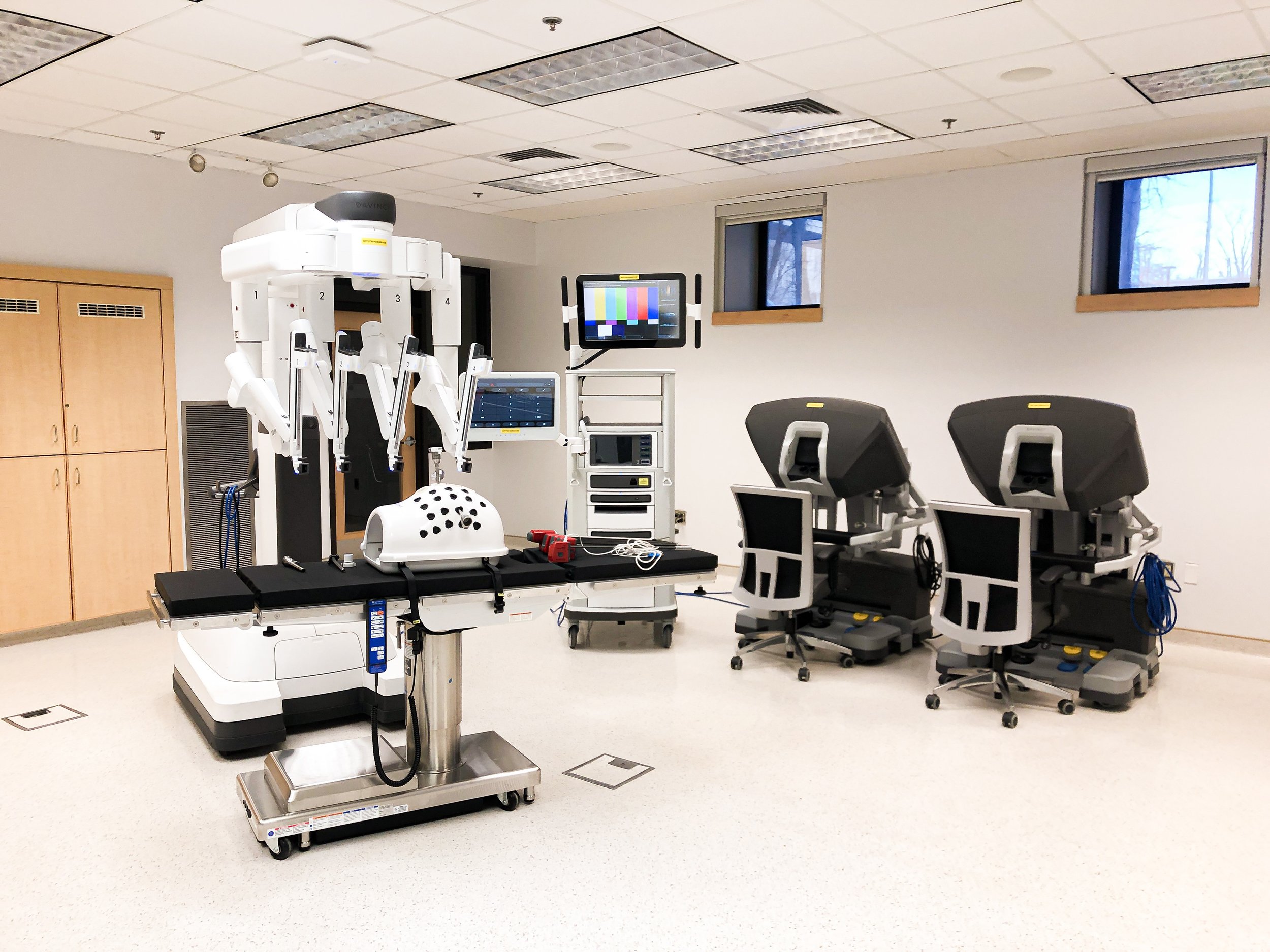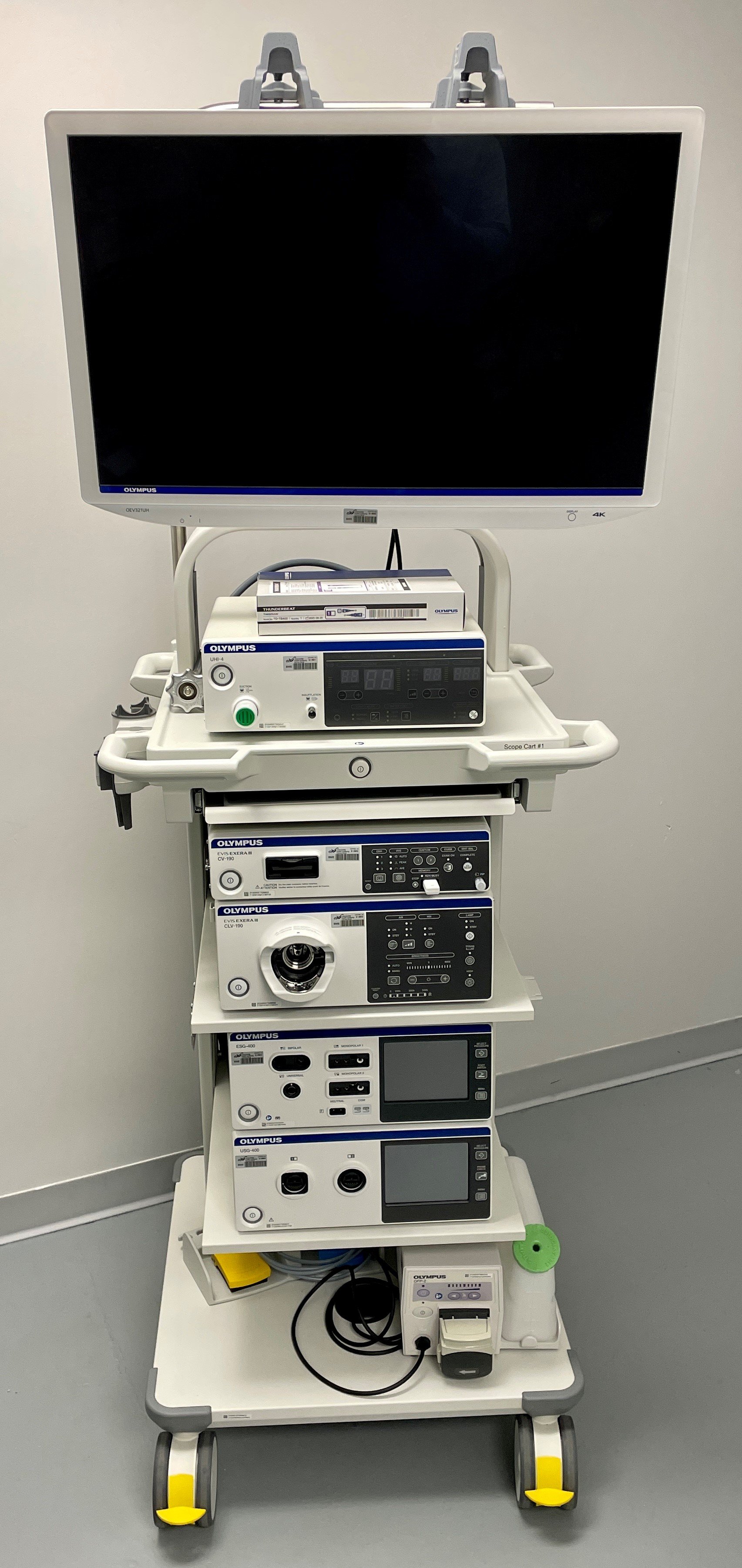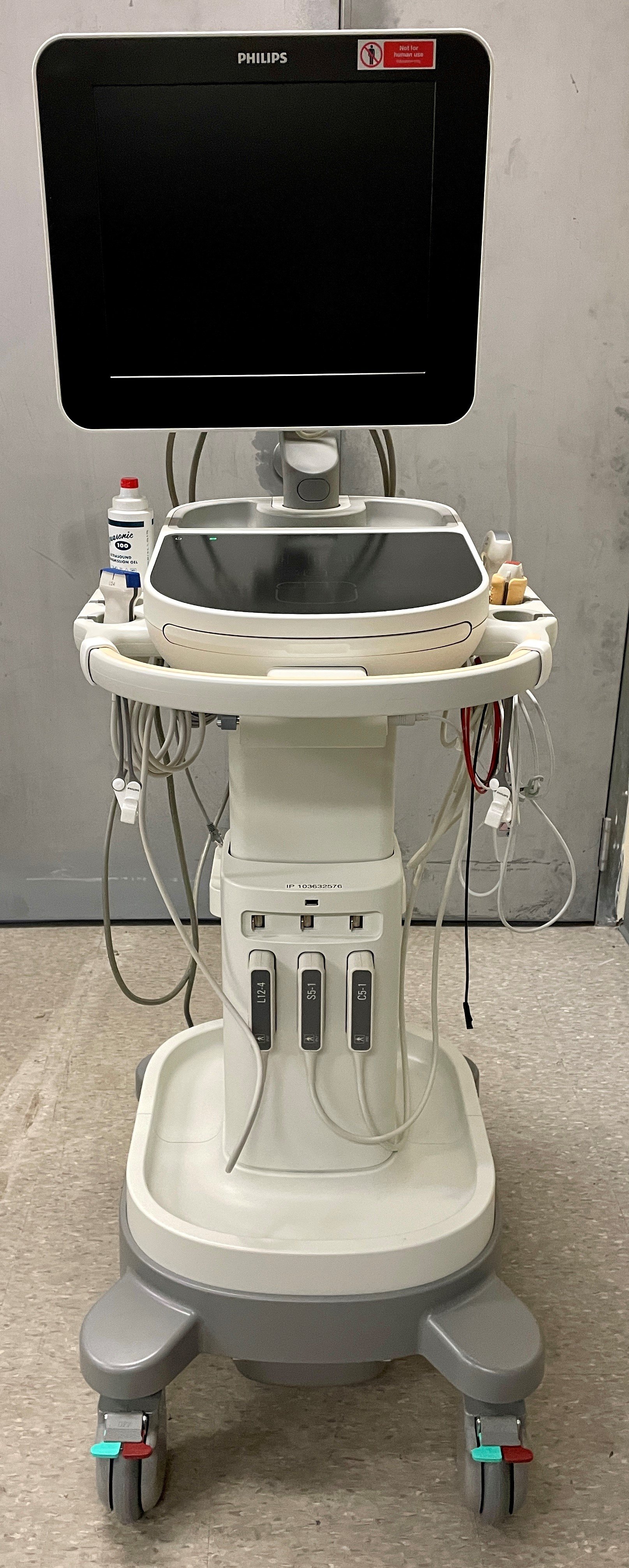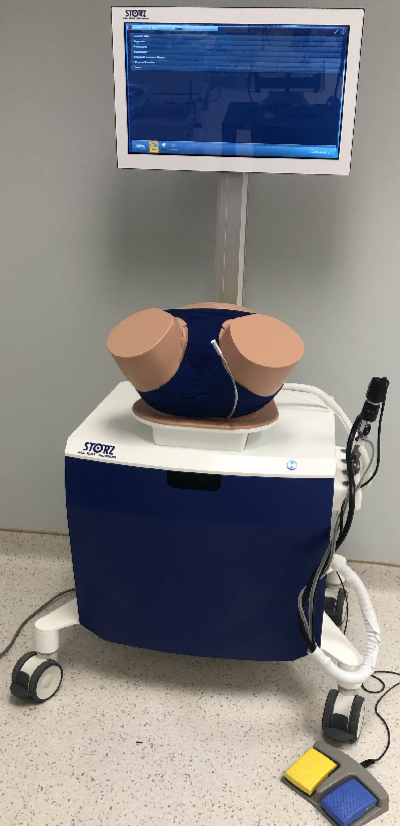
News
April 25, 2024 - New E-board at the Skills Centre
📣 Announcement: New Samsung E-Board Installed at our Skills Centre.
We're pleased to announce the installation of the Samsung E-Board at our Skills Centre! This advanced digital whiteboard promises to enhance collaboration and learning experiences for our community. With its user-friendly interface and interactive features, including touch-screen functionality and crisp display, the Samsung E-Board offers new opportunities for engaging and productive sessions. From group discussions to interactive presentations, this innovative addition equips us with tools to facilitate meaningful learning experiences. We look forward to exploring the possibilities this technology brings to our educational endeavors.
Our new Samsung Flip 3.0 E-board
Internet access is available, or use as an ‘output screen’ for your laptop.
April 04, 2024 - QEII Simulation supporting research - ULTRA Cadaver CPR Research
The Skills Centre is always eager to support local facility and their research. On April 4th we were very excited to provide the setting for a busy ULTRA Cadaver Research Session. This session was led by our very own Dr. Gould and his multidisciplinary research team from across Canada.
While today’s standard hand placement for CPR is mid lower sternum it may not be as effective as left sternal border hand placement to produce optimal ventricle compressions. This cadaver component was just one part in this study to examine the effects of rescuers’ hand placements during CPR compressions and any injuries following CPR.
The team performed CPR compressions under x-ray, using a variety of rescuer’s hand placement on 6 cadavers. Another local surgeon involved in this study was our very own Dr. French, who performed a thoracotomy after CPR compressions to note any injuries to ribs or internal organs.
We are very excited to see how this research study may impact CPR guidelines in the future!
March 20, 2024 - Emergency Department In Situ Trauma Simulation
The session was facilitated by Dr. James Gould, Director of Education with Trauma NS, EM faculty, and trauma team leader. The team consisted of the trauma team members along with working on-site emergency department staff. This in situ trauma sim focused on team dynamics and communication, resuscitation, and hemorrhage management in a patient who was involved in a high-speed blunt-force trauma incident. The patient was successfully resuscitated and the simulation was followed with a team debrief. The QEII Simulation Program staff always looks forward to these in situ opportunities and supporting simulation-based learning.
March 14, 2024 - New Patient Simulator Transport Cover
Due to some concerns raised about patient simulators being perceived as live patients or cadavers when transporting, our new Simulation Specialist Chanel made this great cover.
February 21, 2024 - Da Vinci Xi Robotic Surgical System on display
Robotic assisted surgeries are improving patient outcomes across multiple specialties and becoming the standard of care for many procedures across Canada. Robotic surgical systems can reduce recovery times, shorten hospital stays, reduce post-operative complications, and increase opportunities for patients to access minimally invasive procedures. The Victoria General Hospital site has seen these benefits from using their da Vinci Robotic System in Urology, Gynecology and ENT surgeries.
As this innovate technology evolves, newer Robotic Systems emerge such as the da Vinci Xi Robotic Surgical System. This multiport robotic system’s versatility makes it one of the most used surgical robots in the world. It can offer a wide range of surgical procedures across many surgical specialties which makes it a great addition to any Operating Room.
This Da Vinci Xi - fourth generation addition offers cutting-edge features:
• Advanced instrumentation
• My intuitive technology that allows access to surgical data via mobile app.
• Highly Magnified 3DHD visualization.
• Firefly fluorescence imaging.
The QEII Simulation Skills Centre was the perfect setting to showcase what this newest edition of advanced da Vinci technology can offer. This hands-on two-day event allowed healthcare providers and leaders to test drive this latest version.
As the standard of care for many surgical procedures moves to robotic surgical systems we are excited to see the positive impacts on patient care.
February 14, 2024 - RT utilizing the new ASL5000
Respiratory Therapist and Interprofessional Educator with The Learning Institute, Bria MacDonald provides teaching on the Hamilton C6 ventilator to CNE Jenna Vardy as well as ICU Fellow Dr. Aulich. The ventilator, when connected to SimMan 3G+ and the Ingmar ASL 5000 can provide realistic ventilator mode management of an intubated patient presenting with more complex respiratory disease processes such as ARDS, asthma, and ILD. Bria is currently developing respiratory scenarios for various learner groups using this new technology.
The ASL unit is available at both the Simulation Centre and the Sim Bay.
February 01, 2024 - 3D Printing: A valuable asset to the QEII Simulation Program
Balancing innovation and sustainability is key to a successful simulation program. In November of 2021, QEII Simulation purchased a Prusa i3 MK3S+ 3D Printer as a pilot to explore the potential benefits of in-house 3D printing for the program.
Beginning with replicating some of the wealth of pre-existing models and trainers already created by the simulation community worldwide, our 3D printing capabilities have grown to be able to produce custom remedies for problems that either have no solution on the market or would be cost-prohibitive to procure.
Among our recent creations are custom polyp molds for a polypectomy trainer and an IV pole bronchoscope holder. These efforts have helped us provide higher quality educational experiences for our learners and solve niche headaches for our staff, all while saving QEII Simulation thousands of dollars a year in the process.
For more information about our 3D printing capabilities, or to request a print please contact us.
You can also take a look at our Thingiverse page HERE.
January 23, 2024 - PRAXES Search And Rescue (SAR) Technician Team
QEII Simulation was recently visited by a SAR Tech Team that operates out of Newfoundland. The group spent the morning running scenarios, as well as practicing I/O placement and needle decompression with the SimMan 3G Plus patient simulator. Afterwards they spent the afternoon practicing hands on with a cadaver in the Simbay’s Cadaveric lab. Using passive oxygenation with a good mask seal on a cadaver can provide these practitioners with insight as they are able to visualize the lungs and see the effect of PEEP.
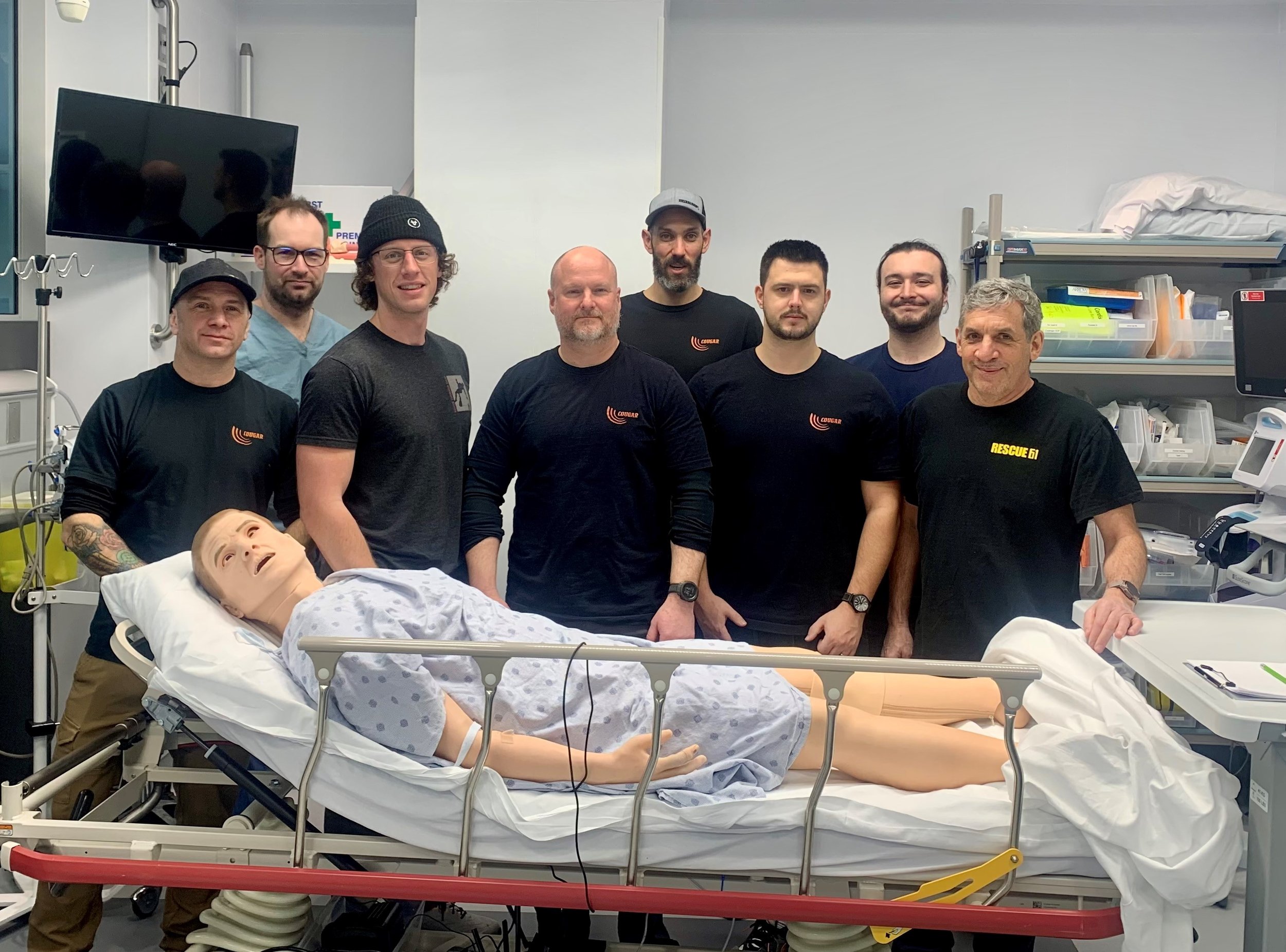
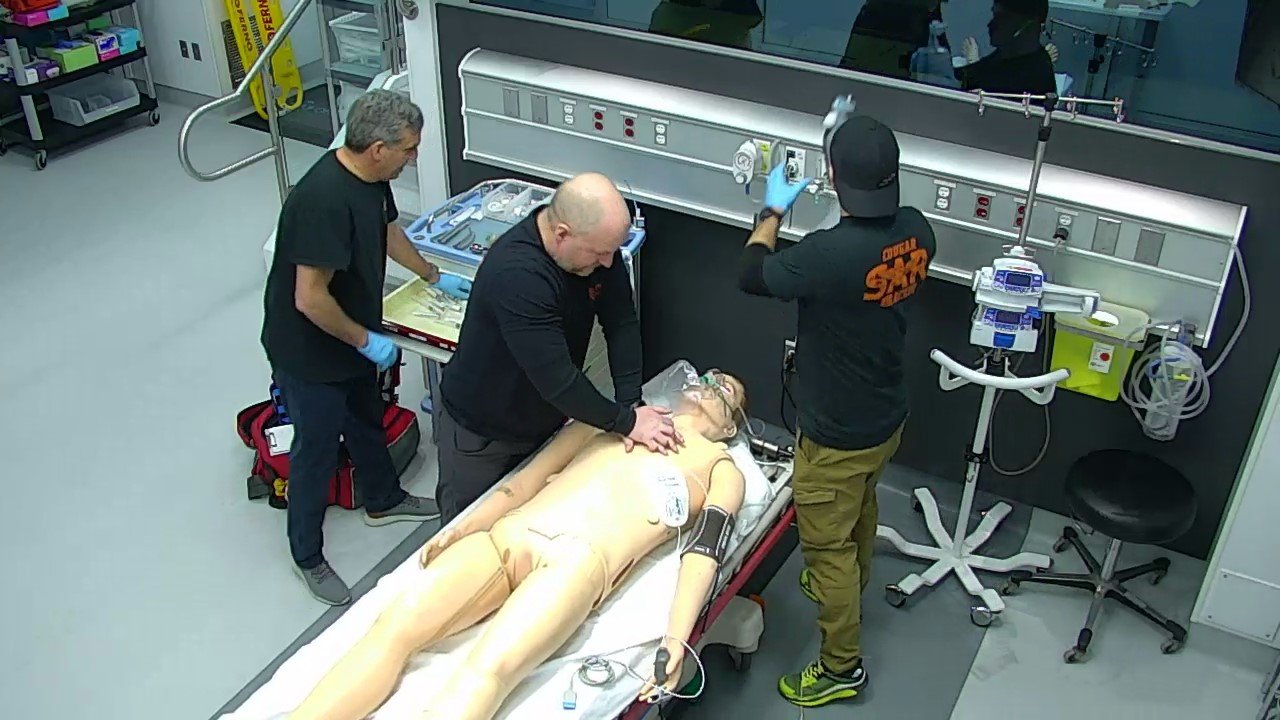
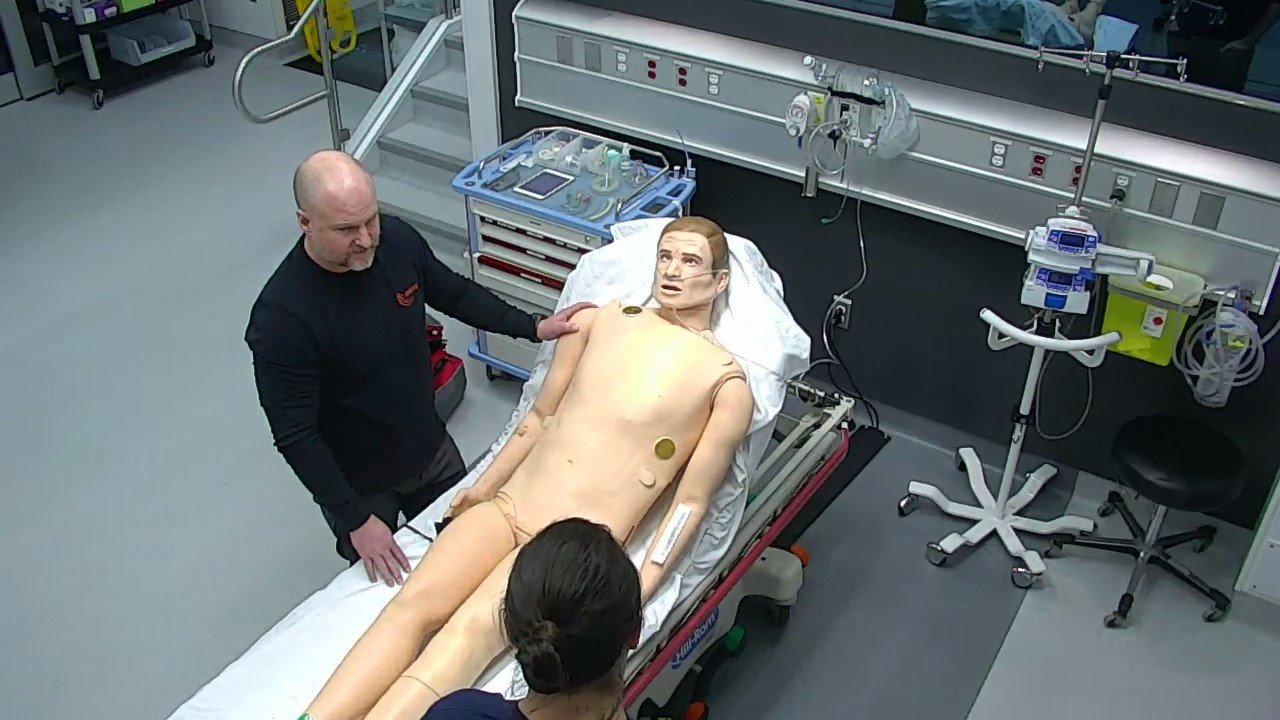
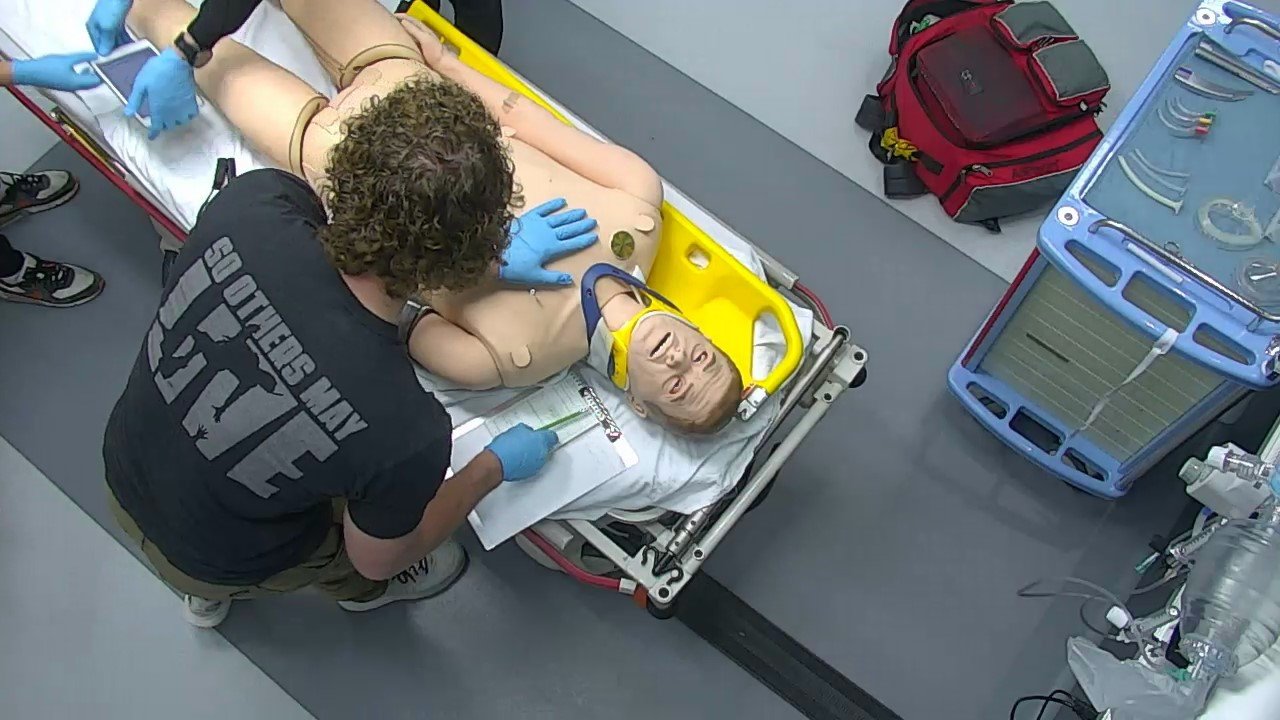
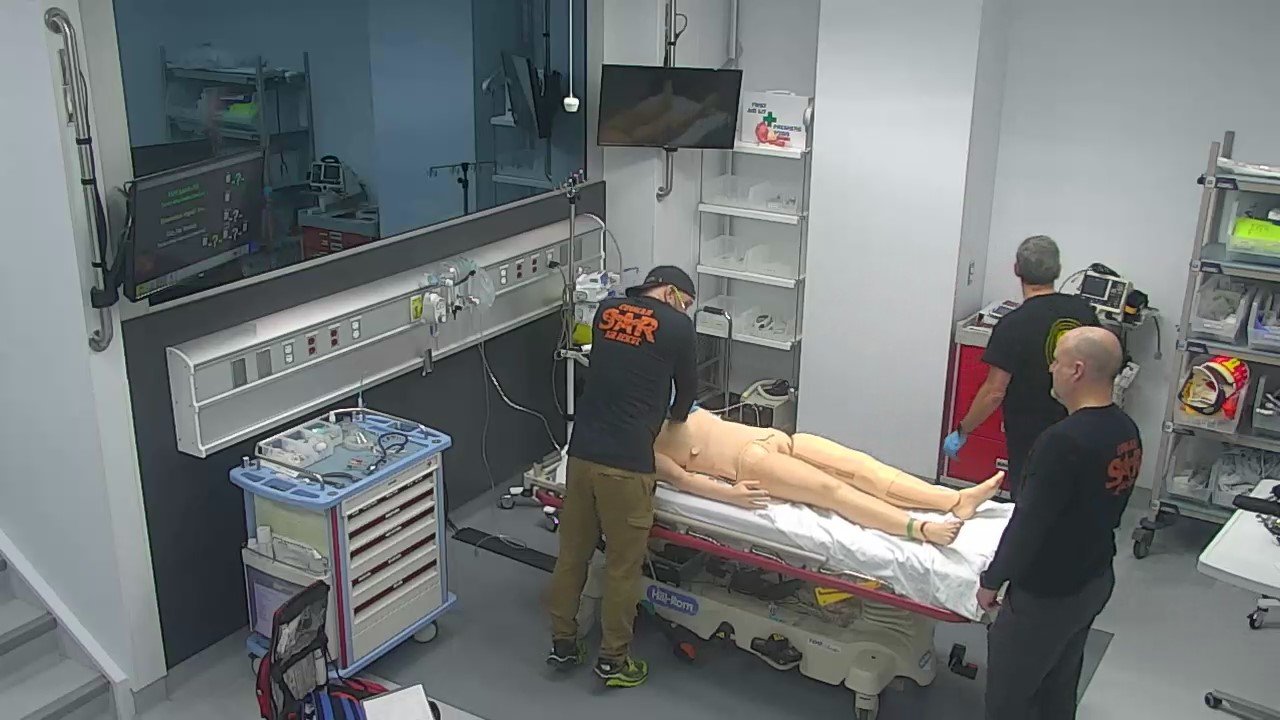
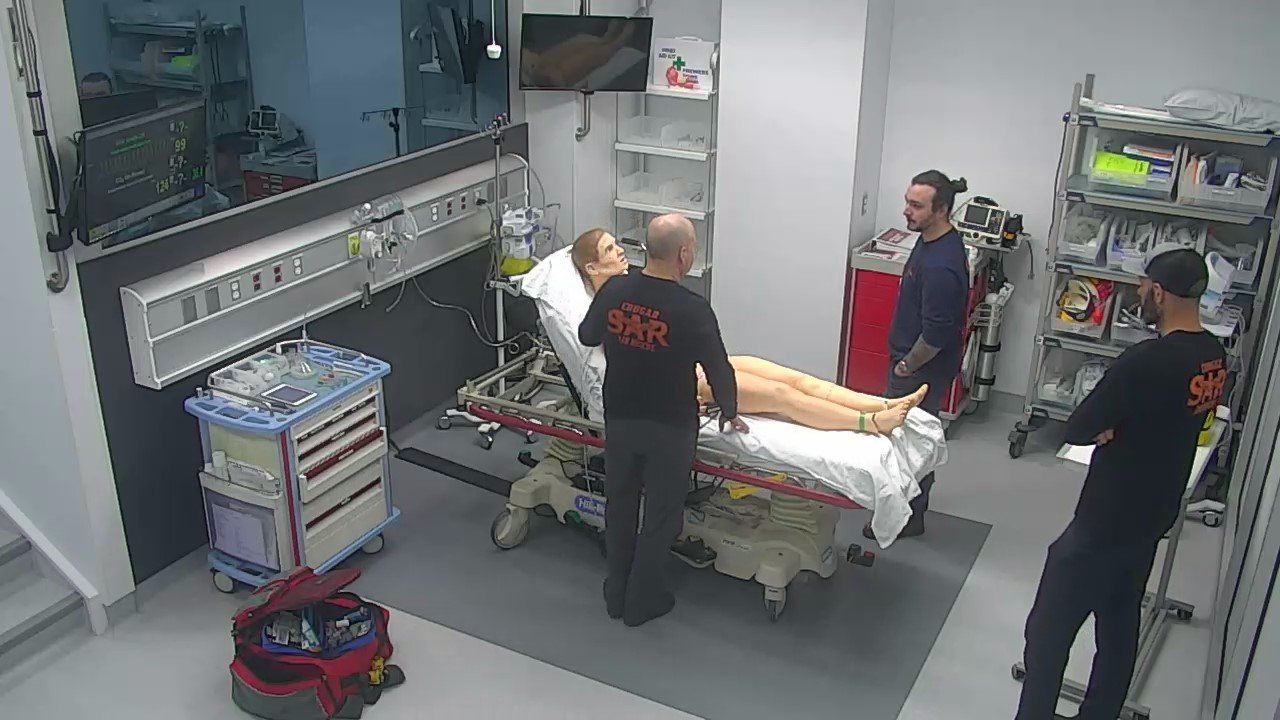
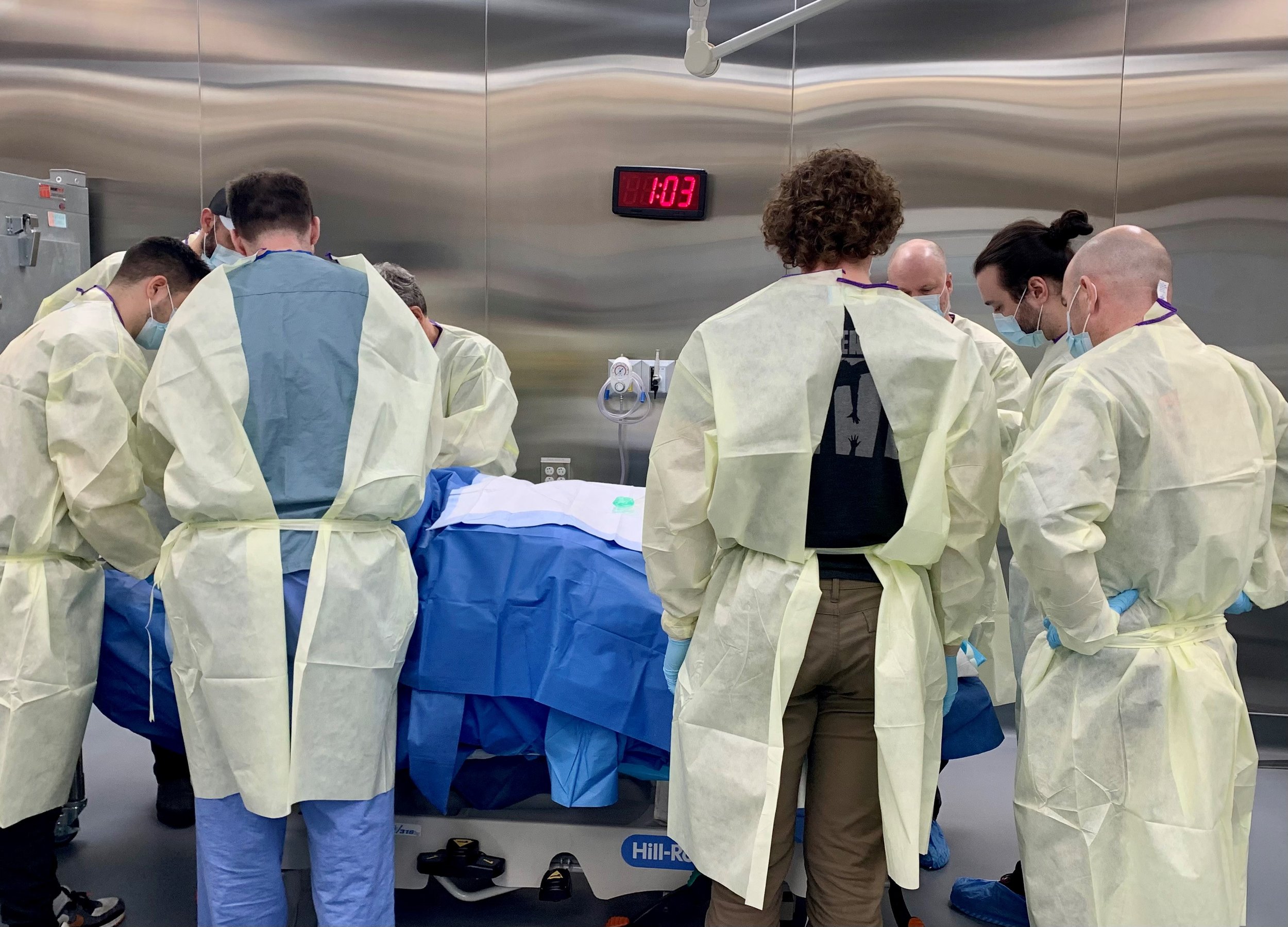
January 04, 2024 - Trauma Team In situ
The QEII Simulation Program and Trauma NS collaborated and delivered the first emergency department trauma in situ simulation of 2024. The simulation was facilitated by Dr. James Gould, ED staff physician and trauma team leader. The rTTL for this case was Dr. Kyle Eastwood PGY-4 RCPS with the Department of Emergency Medicine. The case was of a 25 y/o male pedestrian who was struck by a car travelling at a high rate of speed. The trauma team received the trauma page and gathered in the ED in room 12. Dr. Eastwood provided the team with a thorough pre-brief outlining the desired patient management plan and a list of intervention priorities, treatments, and procedures. Once the trauma team received the handover from EHS, the team quickly and efficiently managed and treated the patient’s injuries. Once the goals of the simulation were met, the case ended. Dr. James Gould initiated the debrief with full team participation.
The QEII Simulation Program team looks forward to supporting more in situ initiatives.
November 22, 2023 - Operation QEII brings healthcare teams and community together in donor-funded Sim Bay and IR Suites
This year, for the first time since the COVID-19 pandemic arrived in Nova Scotia, QEII healthcare staff from the Halifax Infirmary geared up for a unique event – the opportunity to invite community members into the hospital for a chance to experience a day in the life working alongside medical professionals.
On September 7, 10 community members, comprised of QEII Foundation donors, volunteers, and board members who care deeply about advancing health care at the QEII, joined QEII healthcare staff for the QEII Foundation’s Operation QEII event.
To kick off this year’s Operation QEII, attendees scrubbed up to tackle a simulated patient emergency in the QEII’s Sim Bay – a 100 per cent donor-funded training hub for healthcare professionals.
Dr. Tania Sullivan, medical director for the QEII’s Simulation Program and physician lead for this year’s Operation QEII, also works directly with real patients in several of Nova Scotia’s emergency departments. She recognizes firsthand the value of simulation programming to prepare care teams for real, high-stakes emergencies. Continue reading here…
November 15, 2023 - SimEd Collaborative Sim Week Video
November 14, 2023 - Celebrating our QEII Simulation Team
Back Row: Donna Warren, Peter Kelly, Jason Follett, Ahmad Qureshi
Front Row: Jennifer Whitehead, Allison Lenihan, Chantelle Russell
Many sim teams across NS are coming together this week to celebrate a late Healthcare Simulation Week.
The QEII Simulation Team took the opportunity to get together to have a celebratory ‘lunch & learn’ and grab a team photo.
November 06 - 08, 2023 - Medtronic's HUGO RAS System Takes Center Stage
In the realm of medical technology, innovation often paves the way for improved patient care and surgical precision. We are happy to host Medtronic's much-anticipated showcase of their revolutionary HUGO RAS (Robotic-Assisted Surgery) System. Medtronic's HUGO RAS System is a game-changer in minimally invasive surgery, merging human surgical skills with advanced robotics.
With its standout features, it promises to redefine surgical precision and efficiency:
1. Enhanced Dexterity: HUGO offers unparalleled precision, enabling surgeons to perform complex procedures with greater control.
2. 3D Visualization: The system provides surgeons with a high-definition, 3D view, enhancing surgical navigation and precision.
3. User-Friendly Design: HUGO is designed with surgeon comfort in mind, reducing fatigue and physical strain during procedures.
4. Connectivity and Data Management: Seamlessly integrates with data systems, facilitating real-time data analysis and remote monitoring.
The QEII Simulation Surgical Skills Centre provides the perfect backdrop for this transformative event. Local medical professionals and healthcare leaders will converge to witness live demonstrations and acquire a hands on experience using the HUGO RAS System's capabilities in various simulated surgical procedures. Medtronic's experts will illustrate how this technology can revolutionize surgery, showcasing its potential to enhance patient outcomes and surgical efficiency. This event emphasizes our commitment to advancing healthcare through innovation. We look forward to the positive impact this groundbreaking technology will have on surgical practices and patient care.
November 01, 2023 - High Acuity, Low Frequency Emergencies
High acuity, low frequency or low opportunity emergencies present unique and formidable challenges. In situ simulation has been shown as an effective tool in medical education and systems integration along with providing and improving team performance in the workplace. The emergency department multidisciplinary team participated in two simulations; an in situ HALO case (upper GI bleed) followed by a TCA overdose case in the Sim Bay. Participants included a clinical pharmacist, staff physicians, a paramedic, and nursing. Both Dr. Laura Wade and Dr. Chris Poss provided rich and thorough debriefing of both simulation events. There will be more sessions in the next few months with sign-up sheets posted in the ED. Don’t miss out.
October 30, 2023 - In Situ at Charles V. Keating Emergency Department
SimMan 3G is the simulator used to support in situ initiatives. The case being presented for this in situ is that of a young man who was involved in an MVC whose injuries meet the criteria for a trauma team activation. The staff from various disciplines who carry the trauma pagers receive the usual incoming trauma page with a ten-minute heads-up for patient arrival at the emergency department. As the multidisciplinary team gathers in the Sim Bay, they are not aware that this incoming patient is a simulation. The team provides the time-sensitive care required to successfully resuscitate and treat the patient all working towards the goal of the best outcome for the patient.
October 19, 2023 - Paramedic Wound Closure Workshop: Transfer to Practice
Advanced care paramedics practice suturing skills at the QEII Sim Bay site. The class provides a controlled environment and all the supplies required. Different scenarios and techniques are brought up and discussed.
Facilitated by Anil Snook, Paramedic Educator in the Central Zone, these Advanced Care Paramedics are practicing various wound closure techniques while also gaining more knowledge about wound management best practices.
October 05-06, 2023 - The Resus Course
On October 5 & 6, the QEII Simulation Program hosted The Resus Course for emergency medicine physicians at Nova Scotia Health.
Day #1 of The Resus Course was hosted in the Skills Center at the Victoria General Bethune Building site. Using clinical grade cadavers, this full-day course offered emergency medicine faculty participants the opportunity to practice emergency medical procedures and skills.
Day #2 of The Resus Course was held in the Sim Bay at the Halifax Infirmary site. This full-day course provided the emergency medicine faculty access and practice to various vascular access trainers, a SALAD (suction-assisted laryngoscopy and airway decontamination) station, and a high-fidelity simulation HALO case. The high acuity, low opportunity (HALO) case was expertly facilitated and debriefed by Dr. Hana Wiemer. The workshops and break-out sessions provided the opportunity to practice and discuss PoCUS skills, TV pacing, Blakemore tube insertion, as well as resuscitation pharmacology.
Please check out their website for more information and educational podcasts: https://www.theresuscourse.com/
The QEII Simulation Program is excited to support this dynamic course.
September 21, 2023 - New Psychological Safety in Simulation Course offered at Dalhousie
September 15, 2023 - Update on Cadaveric Delivery Cost and Invoicing
Beginning October 01, 2023, the QEII Simulation Program will be taking over the responsibility of invoicing for all cadaveric specimen deliveries between Dalhousie University and QEII Simulation facilities. Currently this is done by Arbor Memorial/First Call.
This has two benefits to users:
1. We will be subsidizing the cost of cadaver transportation. Our internal users can expect to see over a 50% cost reduction – helping to reduce any fiscal barriers.
2. It will reduce the number of invoices you receive for each session. The invoice from Arbor Memorial will be eliminated and you will now only receive an invoice from Dalhousie for the specimens, and the QEII Simulation Program.
The invoice from the QEII Simulation Program will now show a “Cadaveric Specimen Delivery Fee” to reflect the transportation of the cadaveric specimens. Please review our updated Fee Schedule.
The fee of “$150 / 1-2 cadavers” reflects the transportation of 1-2 full cadavers or specimen pouches.
We hope that this change will have a positive benefit to your program. Please don’t hesitate to contact us with any questions
September 07, 2023 - The QEII Foundation’s Operation QEII - Code Stroke
On September 7th the Department of Diagnostic Imaging, the QEII Simulation Program and the QEII Foundation collaborated and organized an Operation QEII Simulation to showcase the Interventional Radiology suites at the Halifax Infirmary. QEII Foundation donors were teamed with physicians and nurses and followed a stroke patient along the treatment path from the Emergency Department (Sim Bay) to the CT Scanner and then to the Interventional Radiology suites for clot extraction. We congratulate the Foundation for hosting a great event and for their continued support of the QEII Simulation Program. The event was a huge success.
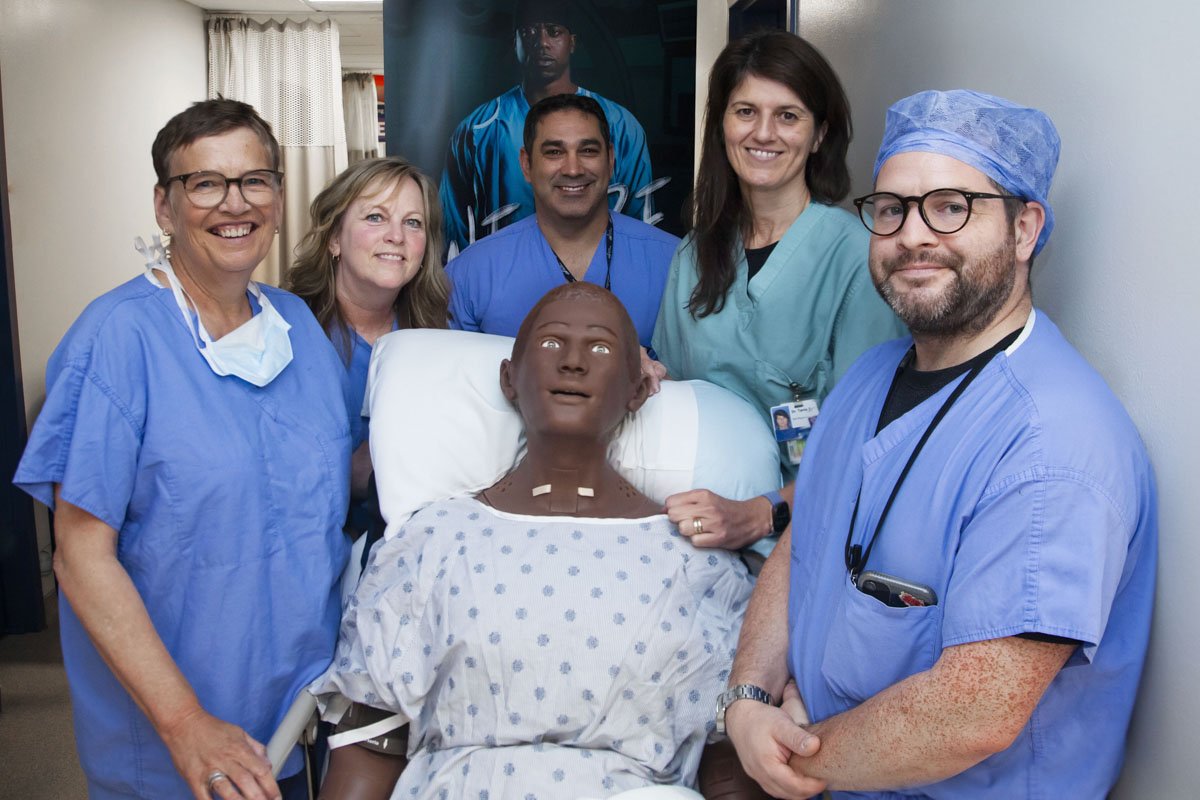
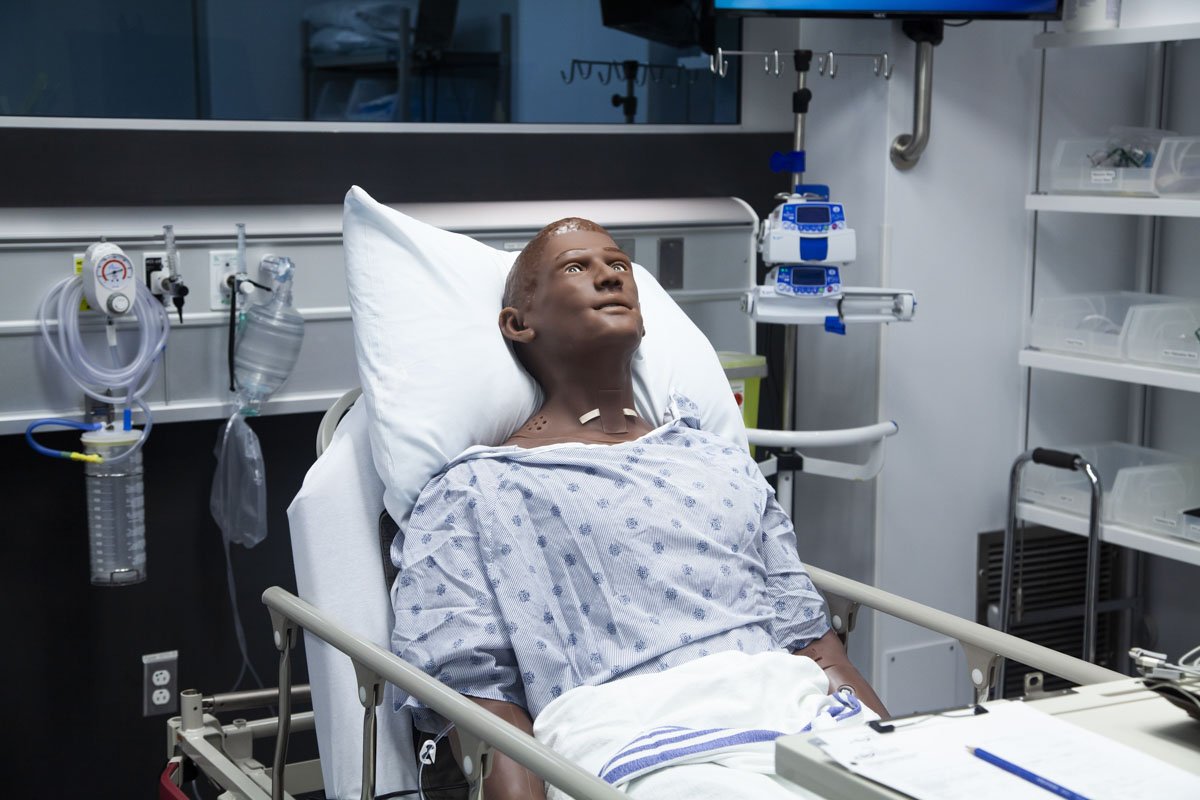
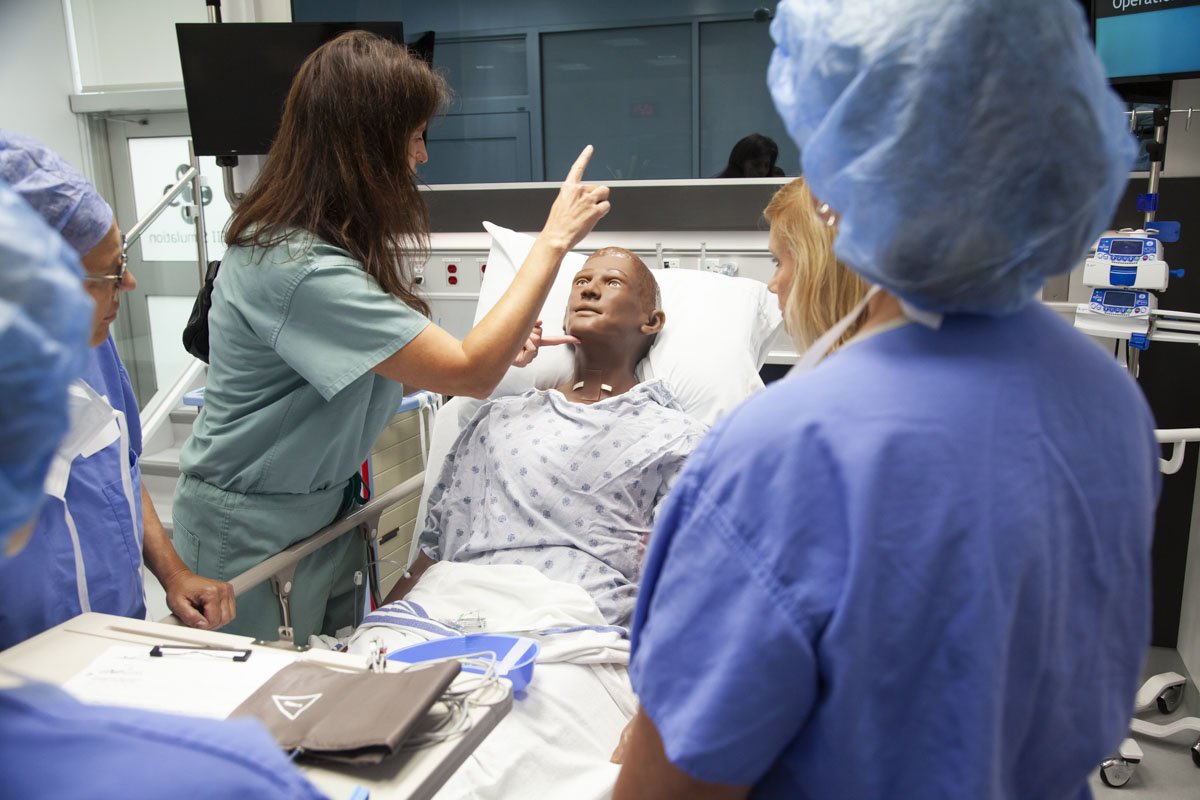
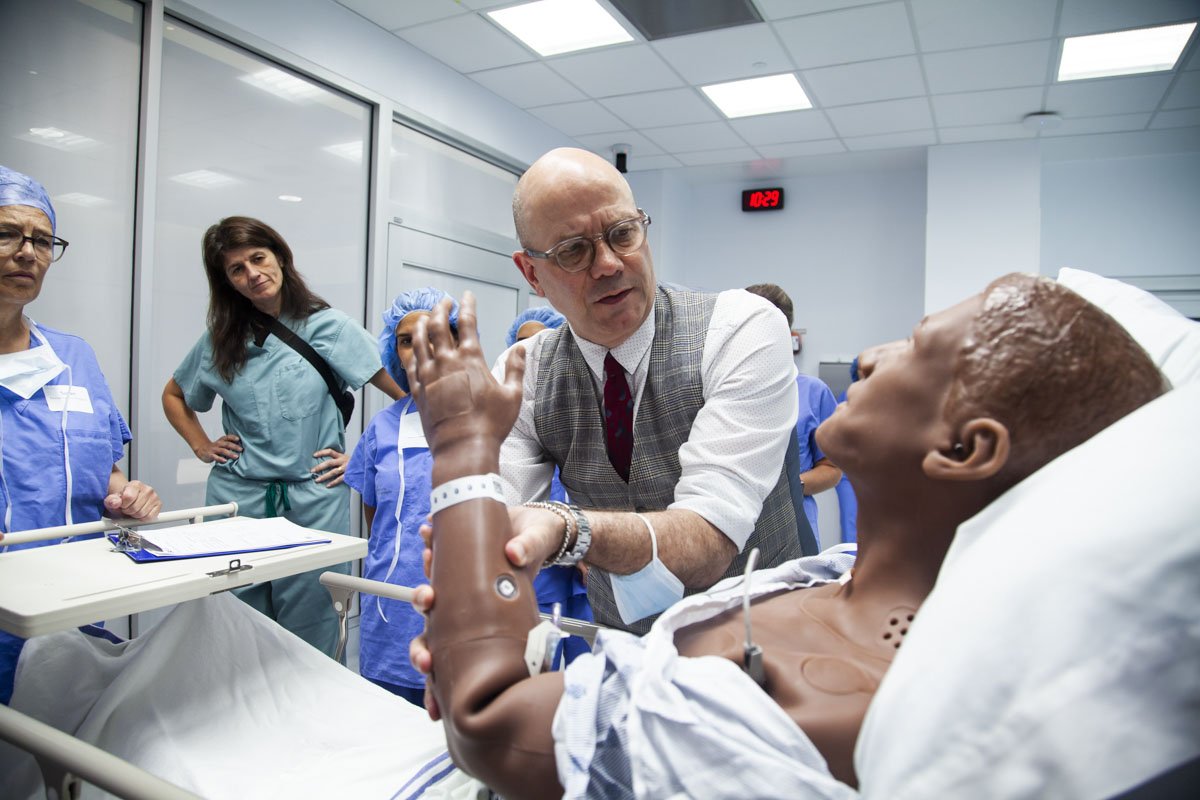
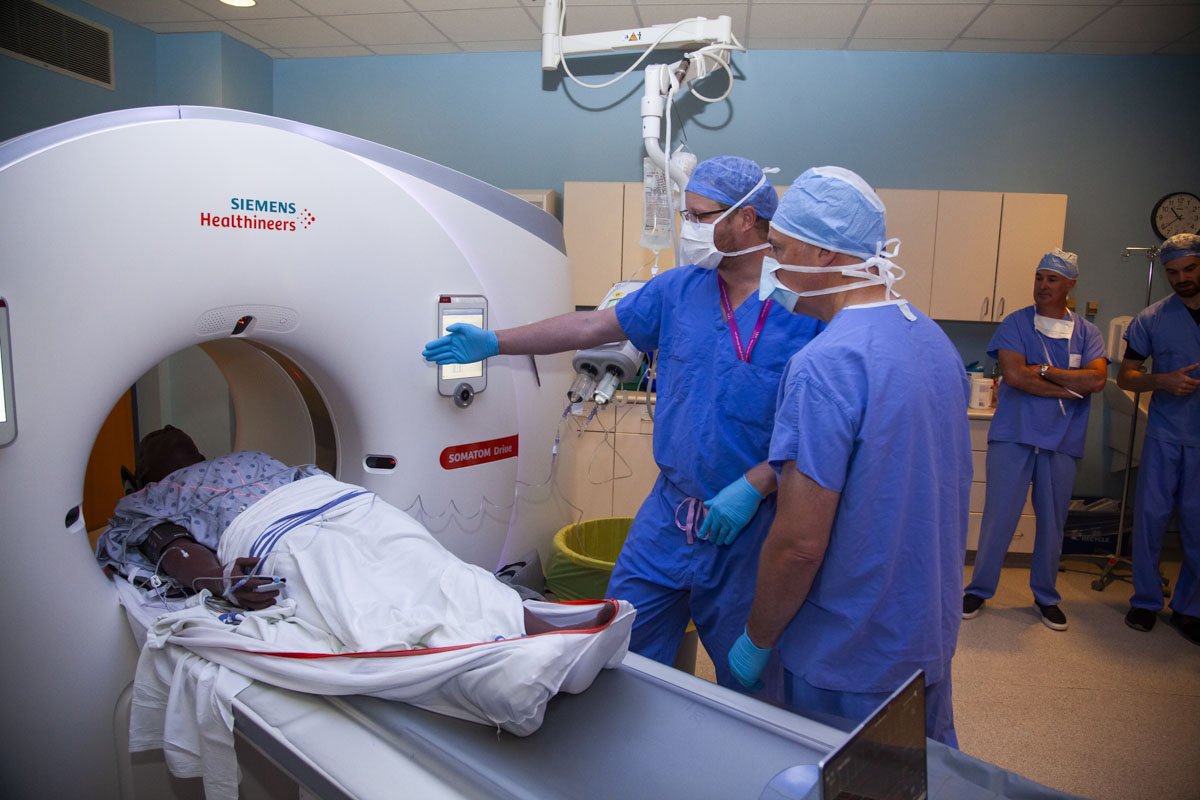
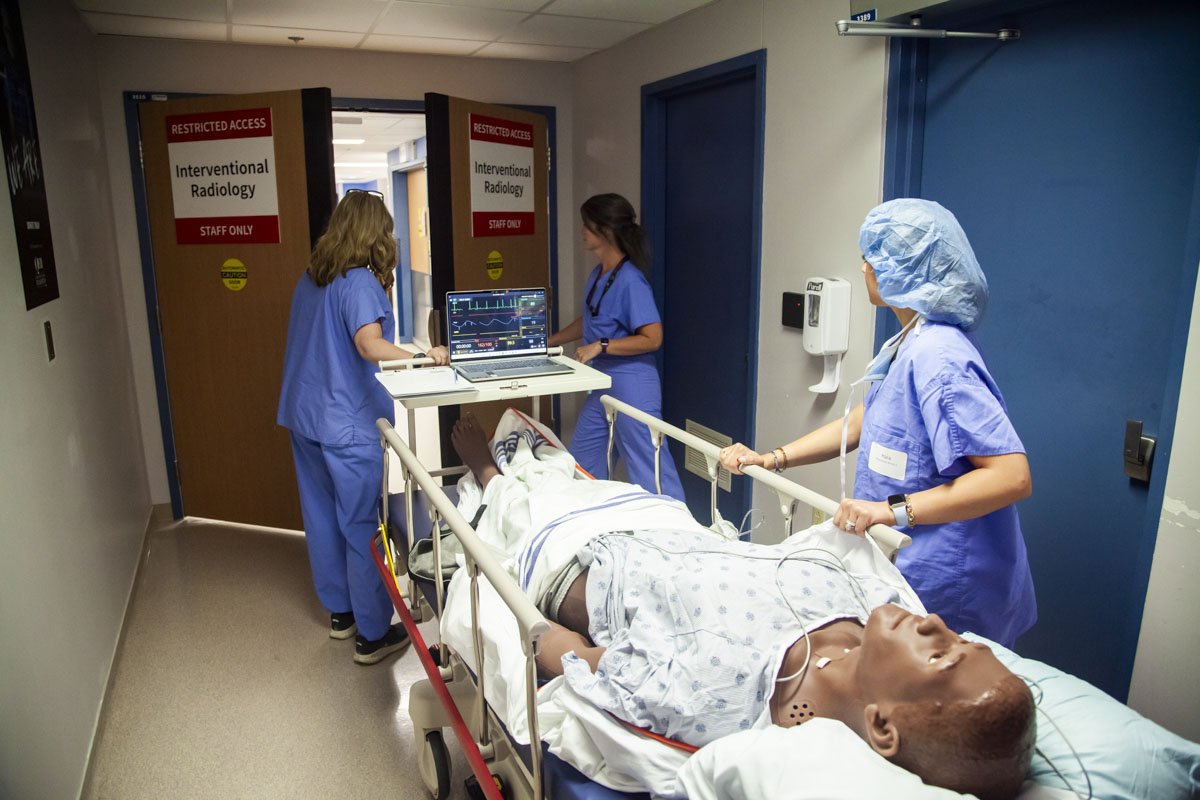
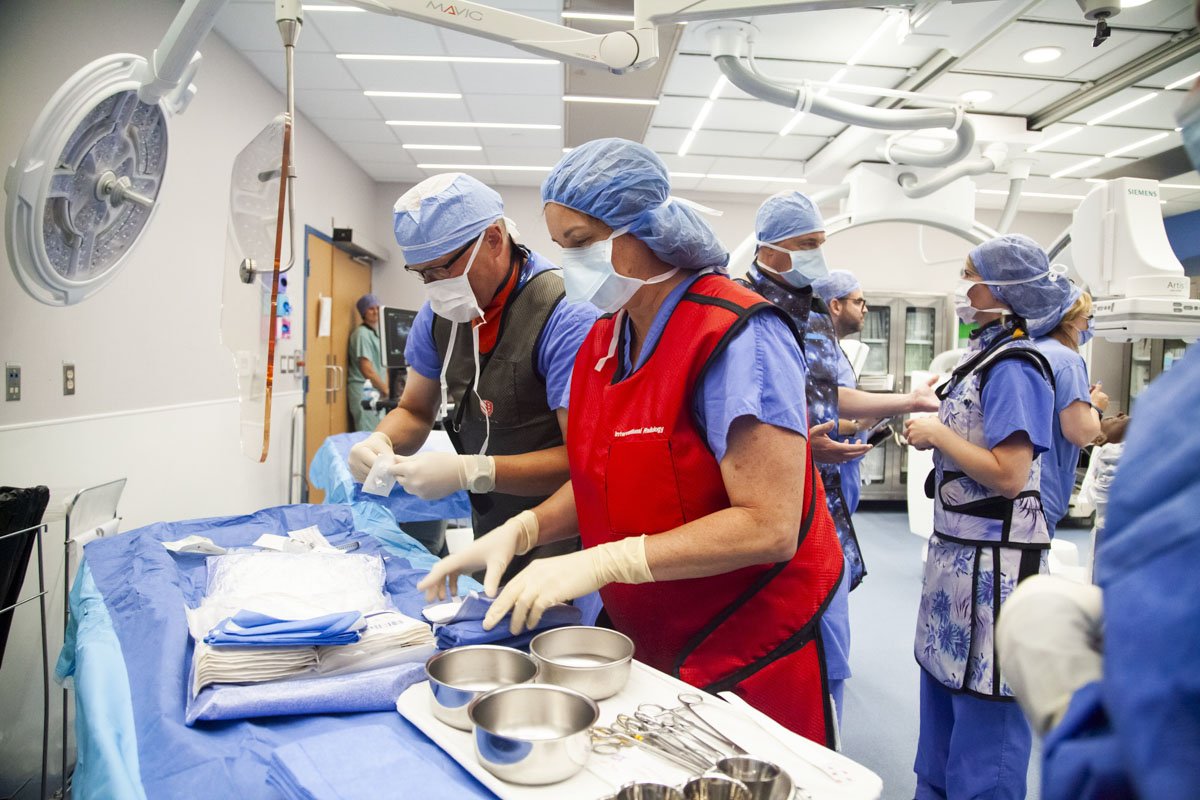
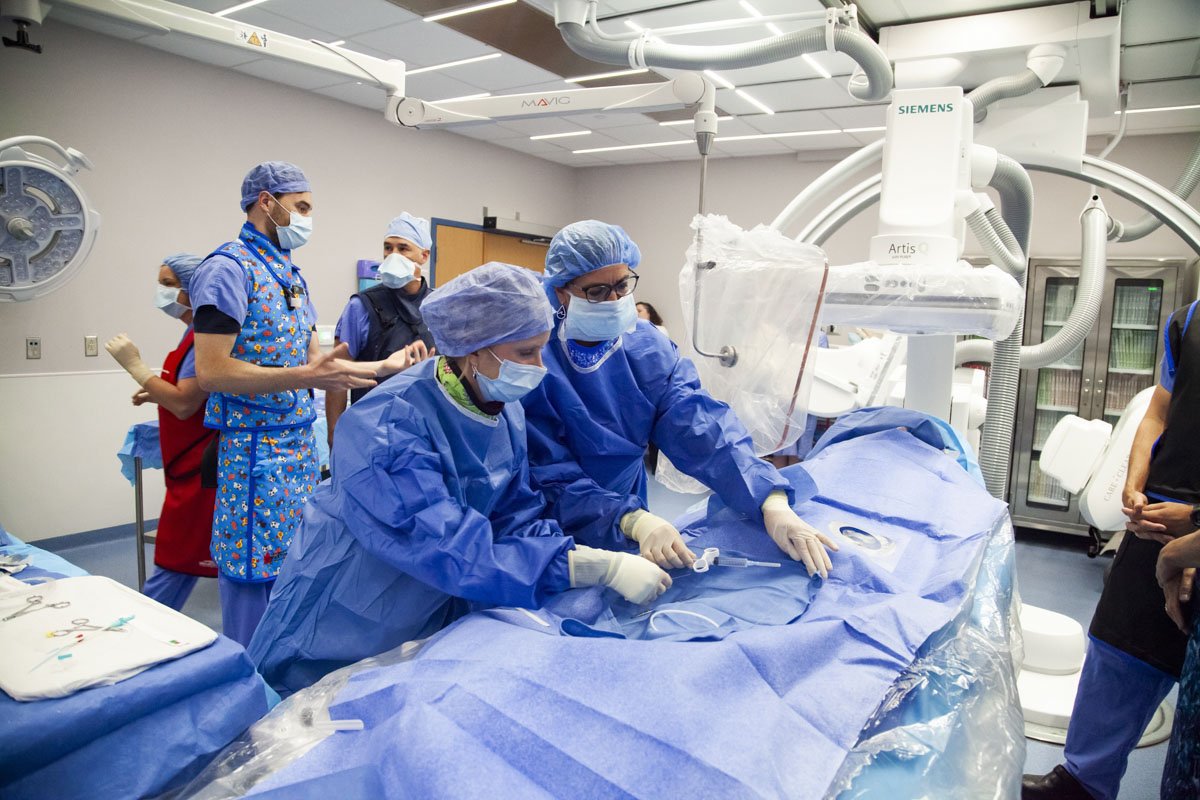
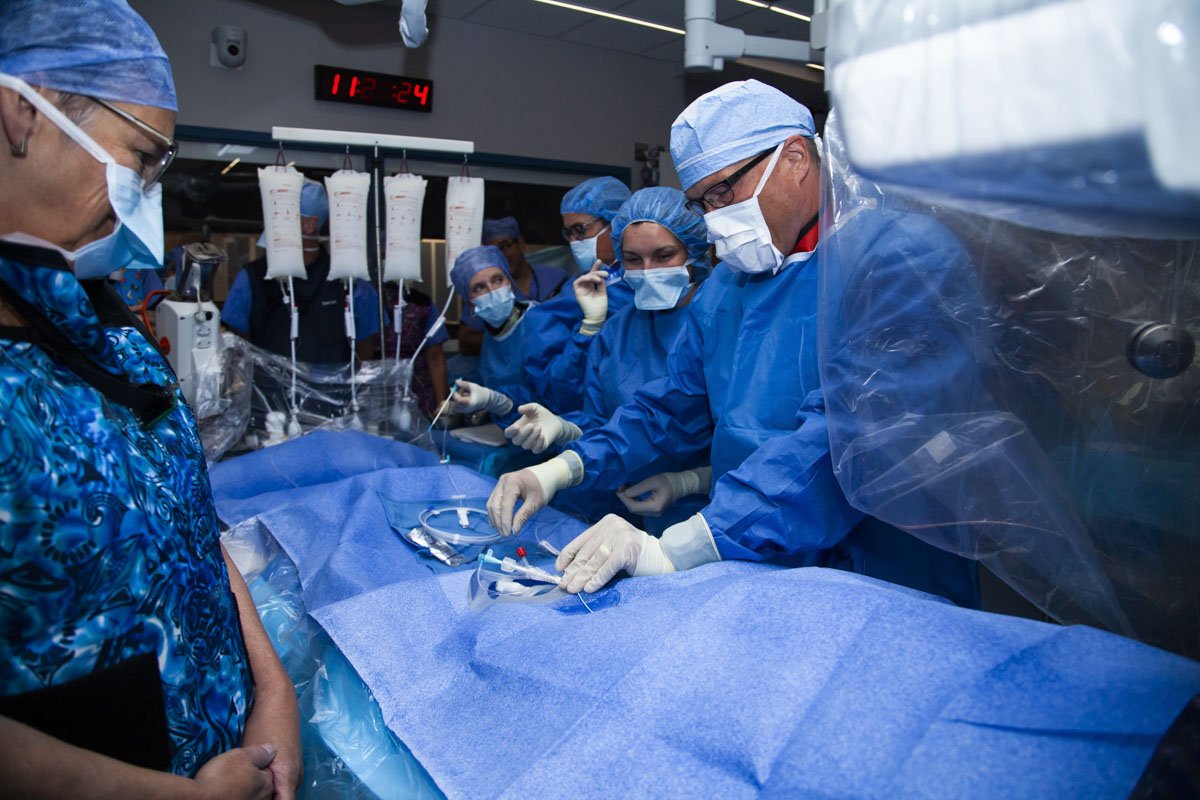
August 16, 2023 - Respirology training at the SimBay
Respirology staff in the Sim Bay using the ORSIM flexible bronchoscope trainer.
The trainer simulates a range of realistic difficult upper airways for learners to practice their skills.
From the ORSIM website:
The ORSIM system consists of three main parts: a replica video bronchoscope, a desktop sensor and a dedicated laptop with software program.
The replica video bronchoscope is connected to the small desktop sensor. The sensor registers movement of the insertion tube and translates this to a three-dimensional virtual airway displayed through the software on the laptop screen. The user can progress through a range of upper and lower airway scenarios receiving instant feedback as well as scoring metrics, recording and play-back.
The ORSIM bronchoscopy simulator provides comprehensive training for a common diagnostic procedure, which until now has required lengthy specialist training. Based on its size, simplicity and economy, it is suitable for large training organizations as well as individual practices.
August 14, 2023 - QEII Simulation’s SimMan 3G Plus patient simulators upgraded with ASL 5000 Lung Solution
The QEII Simulation Program is happy to announce the recent purchase of two Ingmar ASL 5000 lung simulators.
The ASL 5000 is a complex artificial respiratory system which will be available to use at the Sim Bay and Simulation Centre with the Laerdal SimMan 3G Plus patient simulators.
The Laerdal SimMan 3G Plus patient simulator has a set of “lungs”, which when ventilated, will provide some basic quantitative and qualitative feedback to the user when delivering oxygen via bag valve mask. The ASL 5000 Lung simulator will bypass the simulator’s lungs providing users the ability simulate scenarios with a ventilator or an anesthesia machine without risk of over inflating the lungs and damaging the simulator.
The ASL 5000 software comes with preset pathologies such as Asthma, COPD, ILD, or ARDS.
In addition, the user can create and save unique pathologies with fine control over the inspiration and expiration volume, speed and quality.
We look forward to incorporating the ASL 5000 capabilities into our future simulations!
July 12, 2023 - Core Airway Management I
In the Sim Bay on July 12th, the emergency medicine residents participated in the Core Airway Management I session facilitated by Dr. Lorri Beatty. The groups took part in a friendly yet competitive game of “put the silicone resuscitator (bag valve mask)” back together again. The winning group had a time of 2:53. High quality bag-valve mask ventilation techniques using various adjusts along with best-look direct laryngoscopy principles and practices were utilized during the morning session.
June 21, 2023 - Interprofessional Simulation Facilitation Course - Fall Flyer
June 14, 2023 - NS Health role out of new Simulation Equipment
The QEII Simulation Program is grateful to be part of NS Health’s provincial roll out of new equipment to support simulation and surgical skills training across the zones.
New equipment is listed on our facility specific and trainers pages, but some highlights include:
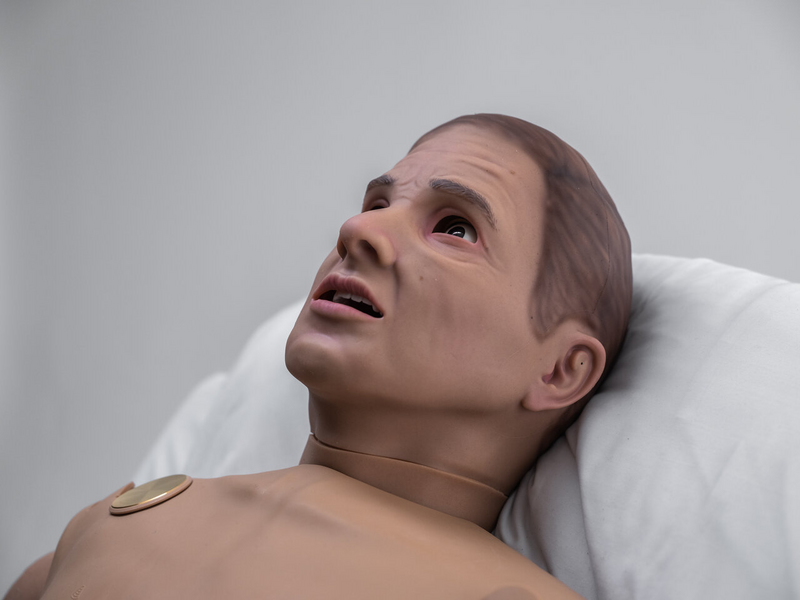
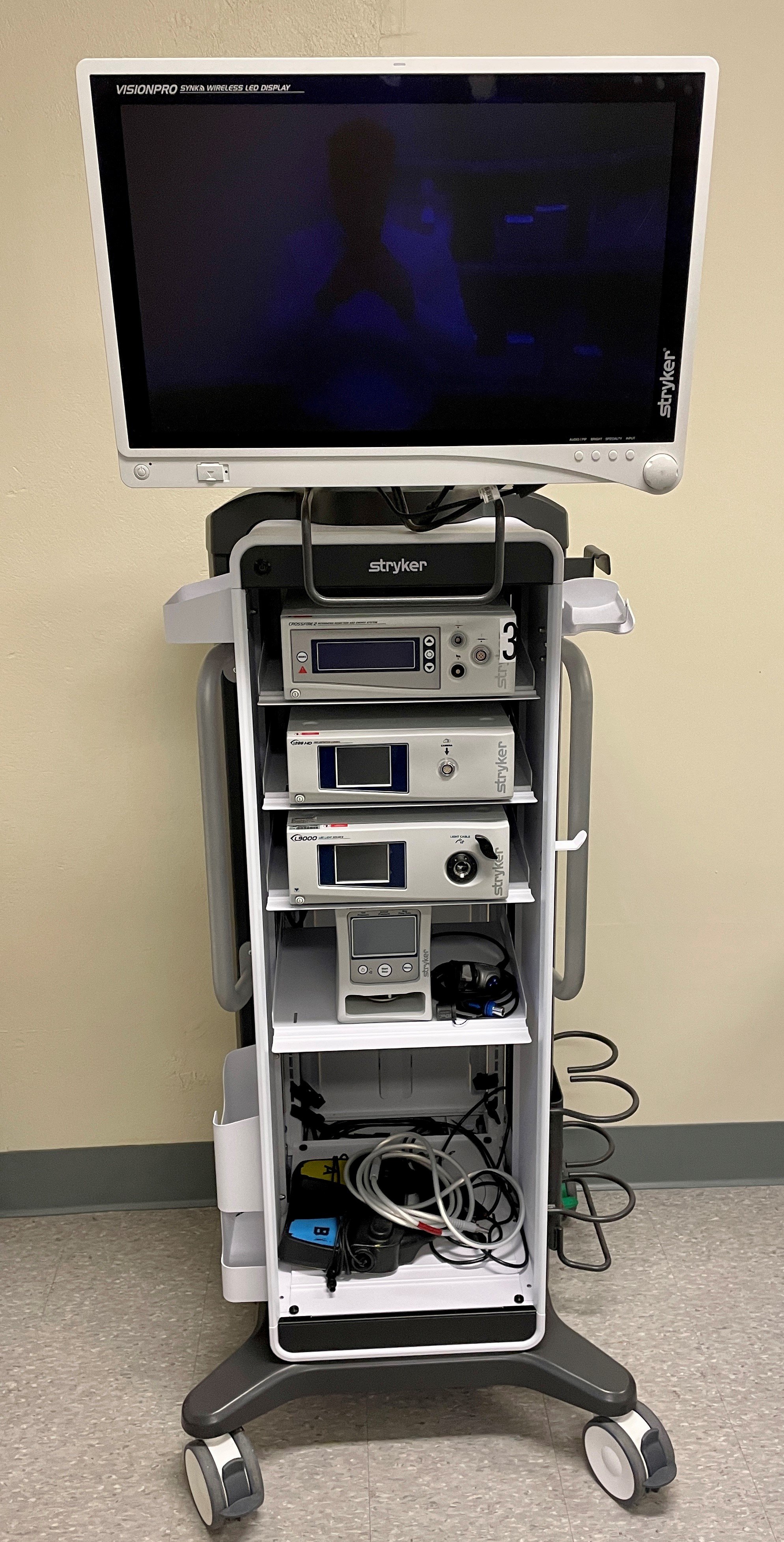
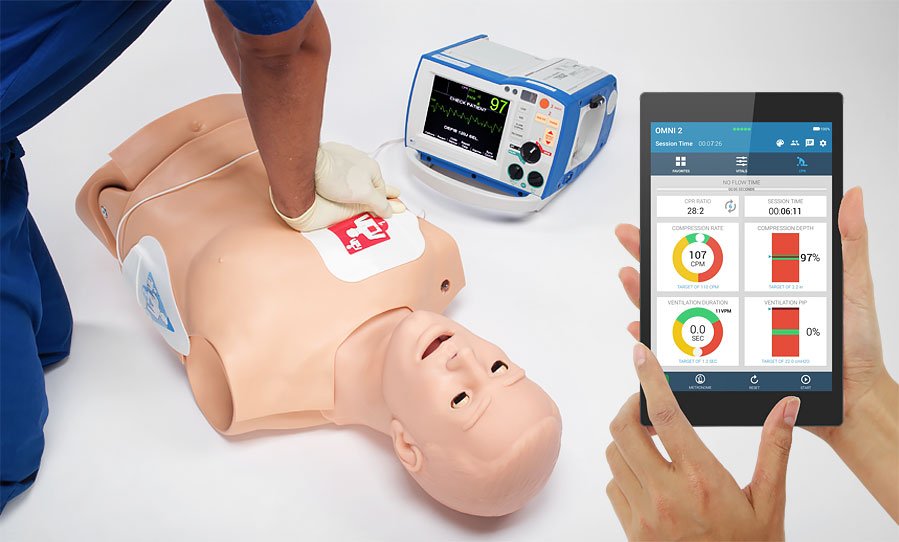
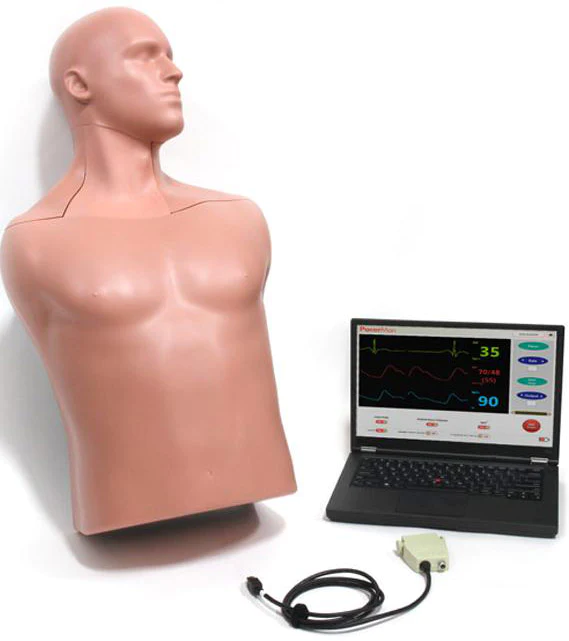
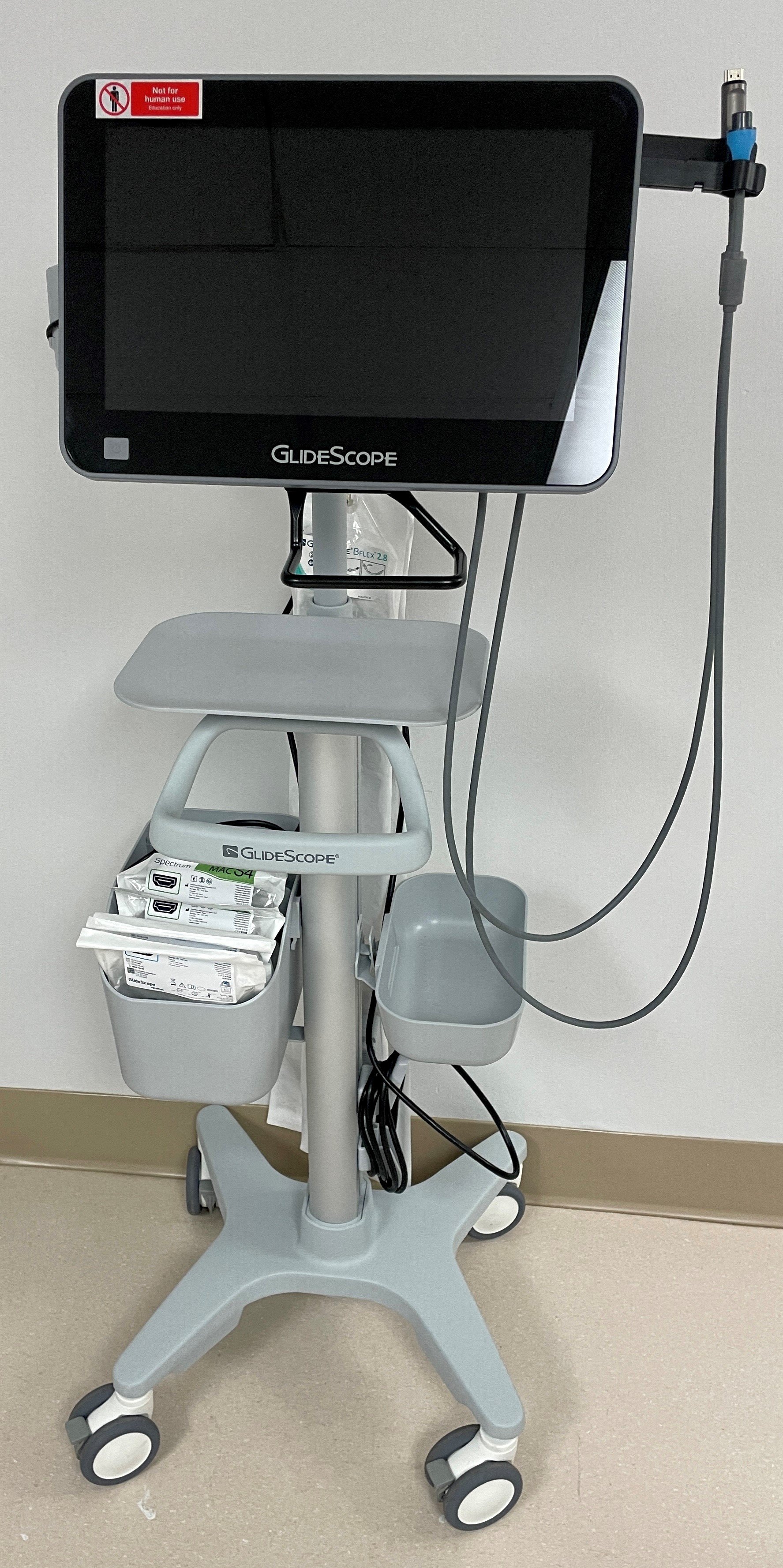
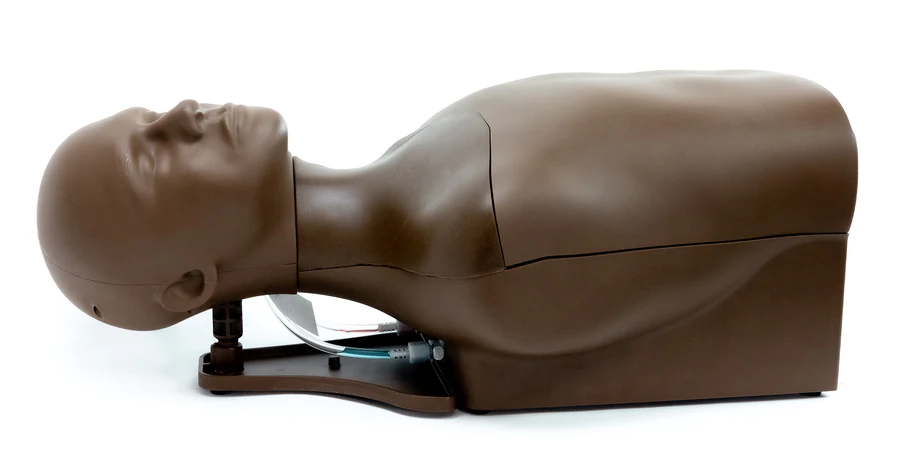
April 25, 2023 - New Haag-Streit Eyesi Surgical trainer for Ophthalmology & Visual Sciences
We are excited to share that the QEII Simulation Program recently purchased a new replacement Eyesi Surgical trainer for the Skills Centre. This is a valuable upgrade that will be utilized by many Ophthalmology & Visual Sciences learners.
From their website:
“Eyesi Surgical offers an immersive environment for training of surgical steps. Through the simulator´s OR microscope trainees see the virtual surgical field in stereo and high resolution while operating with lifelike surgical instruments. Just as in real surgery, discreet instrument movements are required to avoid undue wound stress, loss of viscoelastic, or diminished red reflex. The highly realistic simulation of interaction with tissue in real-time increases trainees’ surgical experience – without risk for real patients.”
March 15, 2023 - RT Students Practice Bronchoscopy Skills
March break does not slow down learners at the Skills Center!
This week the Dalhousie Respiratory Therapy students held a session to practice their bronchoscopy skills.
Using task trainers, simulators, and animal tissue the students were able to acquire bronchoscopy skills and knowledge through high-fidelity simulations.
March 10, 2023 - Fully Funded Fellowship Availability for Simulation Research and Education at the Leahey Clinic in Boston
To: All Residents and Medical Students at Dalhousie interested in an academic enrichment opportunity
Re: Fellowship in Simulation and Professional Education at Lahey Hospital in Burlington, MA, USA
Interested? More information here: Simulation Fellowship
January 23, 2023 - Trauma In Situ Simulation
The QEII Simulation Program, Trauma NS and the Dept of Emergency Medicine collaborated and delivered the first emergency department trauma in situ simulation of 2023. The trauma in situ was planned and facilitated by Dr. James Gould, EM faculty at the Halifax Infirmary ED. The trauma team received their page that a trauma patient was en route to the ED not knowing that this was a simulation. Once the full team gathered in the patient room, the resident trauma team leader (rTTL), Dr. Kendra MacCuspic EM Royal College R-2, went around the room and provided introductions and role assignments giving very clear instructions on what treatments or procedures should be anticipated or required as per the patient condition.
Once the patient arrived and EHS provided a verbal handover, the trauma team began a thorough assessment of the patient. Anesthesia, respiratory therapy and the critical care paramedic discussed an airway/medication treatment plan and intervention strategy; the ED nursing team attached the patient to all monitors and provided clear communication with the other team members regarding patient vitals and other interventions they provided; the general surgery resident performed a thorough head to toe primary survey all the while being guided by the rTTL. Conversations with Dr. Gould and the simulation specialist were ongoing during the simulation and vitals were changed on the fly depending on the desired response to treatments and interventions. Once the goals of the simulation were met and the case ended, Dr. Gould gathered the team to reflect on their experience and facilitated the debrief. The simulation was a huge success and many more are being planned for 2023.
January 05 & 06, 2023 - The Resus Course
The QEII Simulation Program hosted the first Resus Course for emergency medicine physicians at NS Health.
Day #1 of the Resus Course was hosted in the Skills Center at the Victoria General site. The course offered emergency medicine faculty participants the opportunity to practice emergency medical procedures and high-fidelity simulations using both cadavers and task trainers.
Day #2 of The Resus Course was held in the Sim Bay at the Halifax Infirmary site. This full day course offered emergency medicine faculty participants the opportunity to partake in both medical and trauma high fidelity simulation cases along with HALO cases. While one group was participating in simulation, the other group was involved in break-out sessions where PoCUS skills were be honed and where resuscitation pharmacology best practice workshops provided a review and refresher for faculty. All simulations were facilitated and debriefed by simulation-experienced emergency medicine faculty.
More dates are booked for The Resus Course in 2023. Please check out their website for more information and educational podcasts: https://www.theresuscourse.com/
The QEII Simulation Program is looking forward to supporting the growth and development of the program.
November 18, 2022 - Trauma Simulations
On November 18, 2022, the emergency medicine residents participated in a trauma-based high fidelity simulation as part of the rTTL (resident trauma team leader) training prior to resident trauma call. Both the ESEM and the Royal College Emergency Medicine junior resident groups participated in the Sim Bay. This session was facilitated by Dr. James Gould and organized by Trauma Nova Scotia.
The residents demonstrated a systematic approach to the care and treatment of a trauma patient who sustained blunt trauma or penetrating trauma. The residents prioritized treatments and interventions while implementing important principles of crisis resource management and ATLS. After each scenario, the residents participated in a debrief facilitated by Dr. Gould.
September 21, 2022 - Critical Care Paramedic Program
On September 21 2022, the QEII Simulation Program hosted the first simulations for the second intake of eight candidates enrolled in the Critical Care Paramedic Program at Nova Scotia Health Learning Institute for Health Care Providers. This program is a 33 week part time program and provides both online and in-person learning. The candidates from this program will be working with both EHS Lifeflight and at the Charles V. Keating Emergency and Trauma Centre. Sean Teed is the faculty lead of this program.
At both the Simulation Centre and the Sim Bay, this group will be participating in high fidelity simulation cases involving complex patient presentations, task trainer skills days along with cadaveric procedural skills days which will ensure that the learners will have ample hands-on simulated experiences during the their program.
Thank you to the Dalhousie Simulated Patient Program who provided an embedded participant who played the role of a family member for one of the simulation cases.
The staff of the QEII Simulation Program look forward to supporting this program and getting to know all of the learners throughout the next several months.
September 12-16, 2022 - Healthcare Simulation Week 2022
Healthcare Simulation Week, sponsored by the Society for Simulation in Healthcare, celebrates professionals who use healthcare simulation to improve the safety, effectiveness, and efficiency of
healthcare delivery.
New methods and technologies are emerging that present enhanced opportunities to improve patient care; as a result, it is an important field in which many healthcare professionals are finding
a lifelong career.
Front - Joanna, Andy, Jason | Back - Jen, Ahmad, Charlie (sim), Donna | Missing - Allison, Peter
August 12, 2022 - Simulation Centre: We Upgraded our In-Ear Listening System
We were experiencing issues with our old Revo earpiece system, so we have upgraded the Simulation Centre’s to the same system that we had installed at the Sim Bay - the Listen iDSP system.
It includes four receivers with earpieces - and the optional LA-430 integrated neck loop. The loop provides industry-leading assistive listening for individuals with telecoil-equipped hearing aids and cochlear implants.
July 25, 2022 - QEII Simulation Program Survey Follow-up Email
The following email communication was sent out today:
Thank you to those that took the time to participate in our survey.
Your feedback about the QEII Simulation Program is very important to us, and we were pleased to see that users were happy with what the program offers. We also understand that there are some concerns. We wanted to assure you that the concerns have been heard, and we are rolling out some adjustments to increase access and equality for our users and to help us ensure we can meet expectations.
This includes:
Hours of Operation:
All three facilities and in-situ support are available Monday-Friday from 8:00 a.m. - 4:00 p.m. (inclusive of setup and cleanup).
New:
• We are now able to consider exceptions to operational hours for large scale conferences and courses. Exceptions are considered on review by the Manager.
Scheduling:
Scheduling is currently based on a first-come, first-served online booking process.
New:
• Block booking with the intention of cancelling unnecessary dates is not allowed. Please ensure you confirm the dates you will require before starting the booking process.
• Requests must contain comprehensive information and will REMAIN PENDING until they are processed by the Simulation Program to ensure required information is attained before APPROVAL will be granted.
Did you know?
- Requests can be submitted a minimum of two (2) weeks, to a maximum of eighteen (18) months, in advance.
Requests made under two (2) weeks in advance may be accommodated under the discretion of the Simulation Program.
- By creating an account, you are able to:
o Book our facilities or in-situ sessions up to 18 months in advance
o Easily repeat your booking on multiple dates/times
o Cancel bookings from your account
o Upload session documents and make notes
o Receive reminder emails
o Submit feedback via survey form
Website:
Our website contains lots of valuable information, including overviews of our facilities, equipment and policies. Please take some time to check it out here!
New:
• We now offer 3D printing! Ask us for details if you have any questions.
• We have recently purchased a Storz Surgical Multi-Trainer and ORSim Bronchoscope. Please contact the Skills Centre for more information.
We also wanted to let you know that Dr. Haroon is moving to a new position as the Dean of Post graduate Medicine. We wish him the best of luck and thank him for all the support and leadership he has given QEII SIM program. Please look for the Medical Director position to be posted soon.
We are always looking for feedback, please contact me by email (andyhowes@nshealth.ca) or by phone (902.219.1310) anytime you have questions or concerns.
Thank you,
Carla MacDonald, MN, RN, CNCC (c)
Interim Director, Learning and Education Resources
QEII Simulation Program
Andy Howes
Manager QEII Simulation Program
July 11, 2022 - Internal Medicine PGY 1 Orientation Sim
July is a very special time for those of us who work in simulation-based medical education. This year at the Simulation Centre was no exception, and the QEII Simulation Program staff helped to welcome the new Internal Medicine Residents.
Every July, we look forward to meeting new residents from across the country and beyond. The Internal Medicine simulation curriculum delivered by Internal Medicine faculty provided robust simulation experiences by exposing the residents to various simulated patient presentations to help ease the new residents into their specialty and ultimately exposing them to simulation as an educational modality.
This orientation experience assisted the residents with not only becoming familiar with various medical cases and patient management, but also providing safe learning opportunities.
The week of simulation for the Internal Medicine PGY-1 group focused on basic knowledge and concepts, clear communication, patient safety, and team-based learning, all of which will be further built upon during their residency. The staff of the QEII Simulation Program look forward to supporting this group in the upcoming educational simulation-based sessions throughout the year.
June 29, 2022 - HALO Project
The QEII Simulation Program’s Sim Bay and staff hosted and supported a two day HALO procedural and instructional video session.
On June 23 and June 28 2022, Dr. David Hung, PGY-2 with the RCPS Emergency Medicine program implemented his residency project. This research project was funded by the Living Lab . The project, called the HALO (high acuity low occurrence) Project, focused on medical education solutions during Covid-19 when capacity limits provided challenging access to procedural learning opportunities. In response to these challenges, Dr. Hung secured funding to create high-quality video content to teach five high risk procedures integral to the RCPS EM curriculum.
The procedures performed were thoracotomy, lateral canthotomy and cantholysis, transvenous pacemaker insertion, pericardiocentesis and resuscitative hysterotomy. Over these two days, two clinical grade cadavers were used to complete this project and achieve the goals of the sessions. In addition to the cadaveric procedures, the resuscitative hysterotomy procedure was executed using a pregnancy silicone model in conjunction with the QEII Simulation Program’s female Lifecast trainer. This silicone pregnancy multilayered abdominal model was combined with a silicone uterus which housed the 3D printed fetus, umbilical cord and placenta.
With the support of the Dalhousie Department of Emergency Medicine and special mention to Drs. Lorri Beatty and James Gould along with the meticulous planning and organizing of Dr. Hung, the HALO Project was an incredible success. Once the video editing is complete, the videos will be open access for all. The QEII Simulation Program looks forward to viewing the final product and showcasing more HALO Project content when available.
- images below are simulated (non-human) -
June 13, 2022 - Dalhousie Nursing Emergency Skills Day
A group of Dalhousie University Nursing students at the Simulation Centre with clinical Nursing educator Meagan Howardson.
Students spend the day running mock code scenarios, incorporating their skills into practice, and learning about prebriefing and debriefing.
March 16, 2022 - Dalhousie hosting Online Simulation Seminar
Dalhousie will be hosting an online seminar titled: BROACHING RACE AND RACISM IN SIMULATION
Date: May 10th, 2022
Time: 7:00 PM - 8:30 PM
MS Teams link: click here
Guests: Dr. Jenny Rudolph, Dr. Erica Gabrielle Foldy, Dr. Tamara Buckley
For more information please visit Dalhousie’s CPD Faculty Development website
March 14, 2022 - Storz Surgical Multi-Trainer
We are very happy to announce that our new multi-trainer has arrived and is ready for use at the Skills Centre.
It supports various training modules for Gynecology, Urology and Arthroscopy (Shoulder and Knee).
Please contact the Skills Centre staff to get a full list of the modules or to book some time to practice on it. After hours usage is an available option if pre-booked.
From their manual:
“The KARL STORZ MultiTrainer combines several disciplines in one platform and offers both novice and experienced surgeons a modern and comprehensive training system for minimally invasive surgery. The simulators provide training in basic skills such as hand-eye coordination and diagnostic tours as well as the option to practice entire procedures such as, for example, polypectomy (GYN), TURP (URO) or meniscectomy (ART).
Special Features:
• Two to three disciplines can be practiced in alternation on one single platform
• Constantly available training solution in a risk-free environment
• Use of original instruments offer the highest level of reality and virtual patient cases
• Digital mentor enables independent yet guided training
• Reproducible and comparable tasks, including management of complications
• Feedback report for objective assessment of performance
• No consumable parts; no reprocessing of instruments”
February 01, 2022 - The printing begins…
With the addition of our PRUSA 3D printer we are creating some much needed models and devices to use in our Centres.
Captured in the pictures below, one of our latest creations is a head mount for ophthalmic skills practice.
The head has eye socket notches to allow placement of a suction mount or an anterior chamber.
This replaces some older foam mounts that were functional, but not practical from a cleaning perspective.
November 17, 2021 - QEII Simulation purchases 3D printer
We have just purchased a new 3D printer and are excited to start experimenting.
We are hoping to print replacement parts for our patient simulators, create new medical educational models, 3d printed scans and more.
We have purchased the Prusa i3. From their website:
“The Original Prusa i3 MK3S+ is the latest version of our award-winning 3D printers. We have upgraded the MK3S with a brand new SuperPINDA probe for improved first layer calibration, added high-quality Misumi bearings and various useful design tweaks to make the printer easier to assemble and maintain. The MK3S+ includes all the proven features of the previous models, including the heatbed with removable PEI spring steel print sheets, automatic Mesh Bed Leveling, filament sensor, power loss recovery (power panic) and safety features. And it is still as silent as ever!”
If you have any suggestions or build requests, please let us know.
The Prusa 3D printer
The first test ‘print’ - our logo!
October 18, 2021 - Surgical robot transforming joint replacement surgery
Go check out the QEII Times article and watch the video below on the purchase of a new surgical robot for orthopaedic surgery.
The QEII Simulation Skills Centre was happy to host the training for this important step in knee and hip replacement surgery.
October 01, 2021 - Mitchell’s Story
A feel-good story from CTV News about trauma survivor Mitchell Murray, including an interview with Dr. Robert Green filmed in the Simulation Centre.
September 20, 2021 - Critical Care Paramedic Program (CCPP)
Today is the launch of the much-anticipated Critical Care Paramedic Program (CCPP) offered by the RNPDC.
This initiative has been two years in the making by a collaborative SME team of individuals from RNPDC, NS Health, EHS LifeFlight and the QEII Simulation Program. The QEII Simulation Program’s Interprofessional Educator and Simulation Coordinator, Donna Warren, has been a member of the team reviewing module content, developing skills checklists as well as integral in scenario development.
There are six Advanced Care Paramedics from across Nova Scotia who have enrolled in this four-month pilot project. This competency based educational CCPP is a robust and complex course which will challenge the learners not only regarding theoretical practice concepts, but also while implementing best practice guidelines. The CCPP uses a high-level interactive e-learning platform and implements many case studies focused on critical thinking and safe and effective practices.
This program will be transformational for the Paramedic profession and advancing the profession in Nova Scotia as well as across Canada as this is the only CCPP program in Canada (outside of private agencies).
September 24 update:
Today was the first simulation day for the Critical Care Paramedic Program (CCPP) students. The scenario focused on the principles in the Foundations Module: patient & family centred care, communication and collaboration.
The simulation today offered a hybrid experience; a high fidelity simulator along with a standardized patient (family member). The debrief was provided by RNPDC faculty and the SME team members from both EHS Lifeflight and the QEII Simulation Program to ensure that all learning objectives and foundational concepts were met while maintaining a safe learning environment.
August 25 & 26, 2021 - Airway Research at the Skills Centre
The Skills Centre supported an airway research study on August 25th & 26th, 2021. The primary objective was to perform a research study comparing different endotracheal tube introducers (stylet, standard bougie, and flexible-tipped bougies (product approved by FDA and under evaluation by Health Canada) when used with a hyper-angulated video laryngoscope (GlideScope) to intubate a simulated difficult airway in cadavers. Upon the completion of each intubation, the A-scope was used to ensure proper placement. The principal investigators (Dr. Orlando Hung & Dr. James McAlpine) proposed that the study participants attend one at a time and intubate each of the four cadavers with each of the introducers. Meaning each research participant (anesthesiologist) would perform a total of 12 intubations with the assistance of the research team and the Skills Centre team. There were 12 study participants (experienced anesthesiologists), which means 144 intubations occurred at the Skills Centre over two days. Each intubation would be video recorded for later analysis.
Each participant took approximately 45 minutes to complete 12 intubations.
Event Notice - Tuesday June 22, 2021 | 7:00 PM - 8:00 PM
The Sim Ed Collaborative FOM FacDev Series presents: Simulated Competence or Real Competence? The Role of Technology in Simulation-based Assessment
Speaker:
Irene Ma, MD, MSc, PhD, John A. Buchanan Chair and Associate Professor, Department of General Internal Medicine, Cumming School of Medicine, University of Calgary, Alberta
Moderators:
Stephen Miller, MD, CCFP(EM), FCFP, MEd, Director of Simulation, Dalhousie University Faculty of Medicine; Co-Chair, Simulation Education Network Collaborative
Objectives:
By the end of this session, participants will be able to:
1. Cite existing evidence regarding simulation-based training and skill transfer
2. List at least 4 ways to incorporate/adopt simulation into CBME in the current era of medicine
3. List 3 conditions under which simulation-based assessment is most beneficial
4. Recognize the role and limitations of technology-enhanced simulation.
For more information, visit the CPD Faculty Development website or contact FacDev@Dal.Ca
April 14, 2021 - New Nasopharyngeal Swabbing video filmed in the Simulation Centre released
When collecting a quality Nasopharyngeal swab sample, you need to remember the 4 D’s: Direction, Depth, Duration and Dialing to ensure the best results. To support learning and training on collecting a swab sample, a new procedure video was filmed at the QEII Simulation Centre. The 4D’s video (below) and accompanying poster can be found on the COVID-Hub under COVID-19 Screening and Testing Resources.
Event Notice - Wednesday May 26, 2021 | 7:00 PM - 8:00 PM
The Sim Ed Collaborative FOM FacDev Series presents: Simulation for Root Cause Analysis and Patient Safety
Speaker:
Dr. Doug Sinclair, IWK’s Vice President, Medicine, Quality & Safety, Doug has over 30 years of experience working in academic health sciences centers as a clinician, teacher, and leader. Previously, he was Chief of Emergency Medicine at the IWK as well as Chief of Emergency Medicine at the Queen Elizabeth II Health Sciences Centre. Most recently, Doug held the role of Executive VP and Chief Medical Officer at St. Michaels Hospital in Toronto.
Moderators:
Kathy Johnston, RRT, BHSc, Med, Coordinator for the IWK Simulation program & one of two IWK representatives to the SimEd Collaborative.
Diane MacKenzie, PhD, OT Reg (NS), Associate Professor & Associate Director & Coordinator MSc (OT) program, one of two Faculty of Health representatives to the SimEd Collaborative.
Objectives:
By the end of this session, participants will be able to:
1. Understand the role of simulation in improving patient safety and preventing adverse outcomes.
2. Discuss the use of simulation for root cause analysis in the investigation of latent threat.
3. Describe the benefit of simulation as a tool for root cause analysis.
For more information, visit the CPD Faculty Development website or contact FacDev@Dal.Ca
April 6 &7, 2021 - QEII Simulation welcomes Canadian Blood Services
We are extremely excited to be hosting Canadian Blood Services again this year. Under the direction of ahoy! productions , they are on site filming educational videos in our Simulation Centre, focused on the important topic of organ donation.
April is National Organ and Tissue Donation Awareness Month. It celebrates organ and tissue donation and raises awareness about the critical need for more donors across the country. Organ donation can make a profound impact on the number of patients waiting for a lifesaving organ transplant.
Facts about deceased organ donation
Only 1–2% of people who die can be considered for organ donation.
Most people can be considered for tissue donation.
Organ and tissue donation are considered only after all lifesaving efforts have failed and it is certain a patient will not survive.
There is no cost to your family or estate if you donate organs or tissues.
Most of the time, there is no way to tell that the person was an organ or tissue donor and you can have an open casket funeral.
The surgery to remove organs and tissues is done with the same care as any other surgery.
*Related from NS Health: “A hero he was” – Kelly’s story
When Steven Patterson suffered a fatal car crash, his mother Kelly knew he would have wanted to be an organ and tissue donor.
To hear her story, watch this video. For more information on organ and tissue donation visit www.legacyoflife.ns.ca.
March 31, 2021 - A note from our Dalhousie Medicine Colleagues on Cadaver availability during their upcoming renovations
The Tupper Building morgue is scheduled to undergo a major renovation to address several deficiencies related to safety and to modernize infrastructure to be compliant with current building codes. This renovation will cause some disruptions in service over a 5-month period. It is anticipated that the work will begin in September 2021 and will run into the month of January 2022.
During the renovation Clinical Cadavers will be unable to be prepared. Given that Clinical Cadavers can be used only over a period of 8-10 weeks, it is expected that Clinical Cadavers will not be available beginning sometime in November until February 2022.
If you will require Clinical Cadaver material over the lead-up period, from September-November, it is extremely important that you submit an Anatomical Request Form as soon as possible and no later than July 30, 2021.
As an alternative to the conventional embalmed Clinical Cadavers, a saturated salt method of preservation can be offered. This approach is low in formaldehyde and results in preservation that is stable over a longer period of time. It may represent a suitable option during the months of the morgue closure from November through February, when usual clinical cadaver preparation is unavailable.
Since cadavers prepared using the saturated salt method have some differences from embalmed Clinical Cadavers and may not be familiar to you, potential users will be invited to examine a saturated salt cadaver (in April or May) to determine if the tissue fidelity will be adequate to meet your needs. The morgue closure means that all donor bodies, regardless of preservation method, must be obtained by mid-August. Therefore, even if it is determined that a saturated salt cadaver will serve your purposes, we will require an Anatomical Request Form no later than July 30, 2021.
The disruption in service is unfortunate, but with adequate lead time and attention to planning, minimal disruption in education is possible. This renovation will result in an enhanced capacity to provide this unique learning experience which is the result of amazing generosity of donors. If you would like to view a saturated salt cadaver, or have any questions or concerns, please do not hesitate to contact Rob Sandeski (Sandeski@dal.ca).
March 23, 2021 - The Sim Bay featured in Dalhousie Emergency Medicine CaRMS video
The QEII Simulation Sim Bay is recognized in the new Emergency Medicine CaRMS video produced by Dalhousie University.
March 18, 2021 - Our New Mobile Video Conference System
We now have a Mobile Video Conference System available for use in our Skills and Simulation Centre, or for loan to use in non-patient areas within the VG complex.
Hardware includes:
- Mobile stand with locking castors
- TV (incl. remote) and Computer (incl. Bluetooth and Wi-Fi)
- Webcam (incl. remote)
- Wireless Keyboard and Mouse
Software includes:
- Windows 10 and MS Office (PowerPoint, Word, Excel)
- Browsers: Chrome, Firefox, Edge
- Video Conference Software: Zoom, Teams, Skype
Please note:
- This does not contain a NS Health issued computer, so you will not be able to login or access shared drives.
- QEII Simulation staff are not responsible for Video Conference software accounts or connections. Connectivity tests should be conducted prior to event.
March 05, 2021 - Anesthesia COVID-19 Personal Protective Equipment (PPE) Study
A COVID-19 PPE study was conducted at the Skills Centre in February.
Dr. Peter MacDougal is the principal investigator who worked with the anesthesia research team and the Skills Centre team to complete this research that consists of 24 volunteered participants. The study was approved by the Nova Scotia Health REB; the aim was to compare the current/standard COVID-19 PPE versus the newly developed, Halifax Gown PPE. A new style of PPE with an integrated gown, hood and face shield known as the Halifax Gown is currently in the approval process for medical devices for Level II protection. The Halifax Gown PPE has a 12 step donning and doffing process compared to the standard PPE consisting of 14 steps. The goal is that health professionals would adopt a process that requires less steps while still achieving the full protection when caring for a COVID-19 patient. A breach of any of these steps places the worker at risk of self-contamination.
During this study, contamination was simulated using a fluorescent mist and examination under ultraviolet (UV) light.
February 02, 2021 - LUCAS 3 Chest Compression System Trials
The QEII Simulation Program has procured two LUCAS 3 Chest Compression Systems from Stryker for a 90 day trial. One device is located in the Sim Bay and the other device is located in the Simulation Centre. The LUCAS 3 system offers a high rate of adequate compressions with decreased total hands off time compared to manual CPR.
This is a great opportunity to escalate the complexity of simulation-based educational learning opportunities being delivered to the various learner groups at each of these sites. Please contact the QEII Simulation Program staff if you would be interested in using the LUCAS 3 device.
The QEII Simulation Program will be working closely with and supporting The Charles V. Keating Emergency and Trauma Centre as this clinical site will be initiating a quality project focusing on the use of the LUCAS 3 in the emergency department during cardiac arrest resuscitation.
As this project is still in its early stages of development, more information regarding this initiative will be provided once this project has been launched.
More information on the LUCAS 3 Chest Compression System here: https://www.lucas-cpr.com
You can find the training materials and videos here: https://www.lucas-cpr.com/resources/#training_materials
December 09, 2020 - Ophthalmology’s CaRMS video
The QEII Simulation Skills Centre is recognized in the new Ophthalmology CaRMS video produced by Dalhousie University.
November 24, 2020 - Dr. Sarah McMullen on CTV News
Dr. Sarah McMullen, a Critical Care Physician, was interviewed in the Sim Bay by CTV News discussing caring for patients with COVID19.
November 06, 2020 - Simulation learning prepares QEII teams to respond to the pandemic
An article by the QEII Health Sciences Centre Foundation on how the QEII Simulation Program assisted in team preparations to the pandemic response - https://qe2foundation.ca/our-impact/news/simulation-learning-prepares-qeii-teams-respond-pandemic











